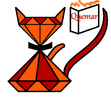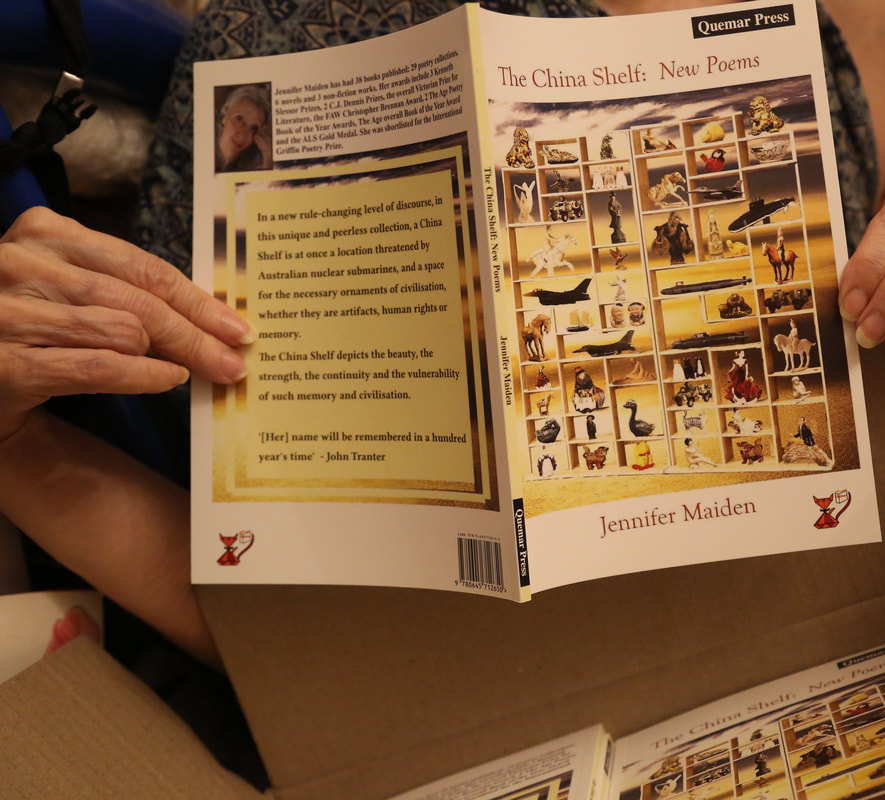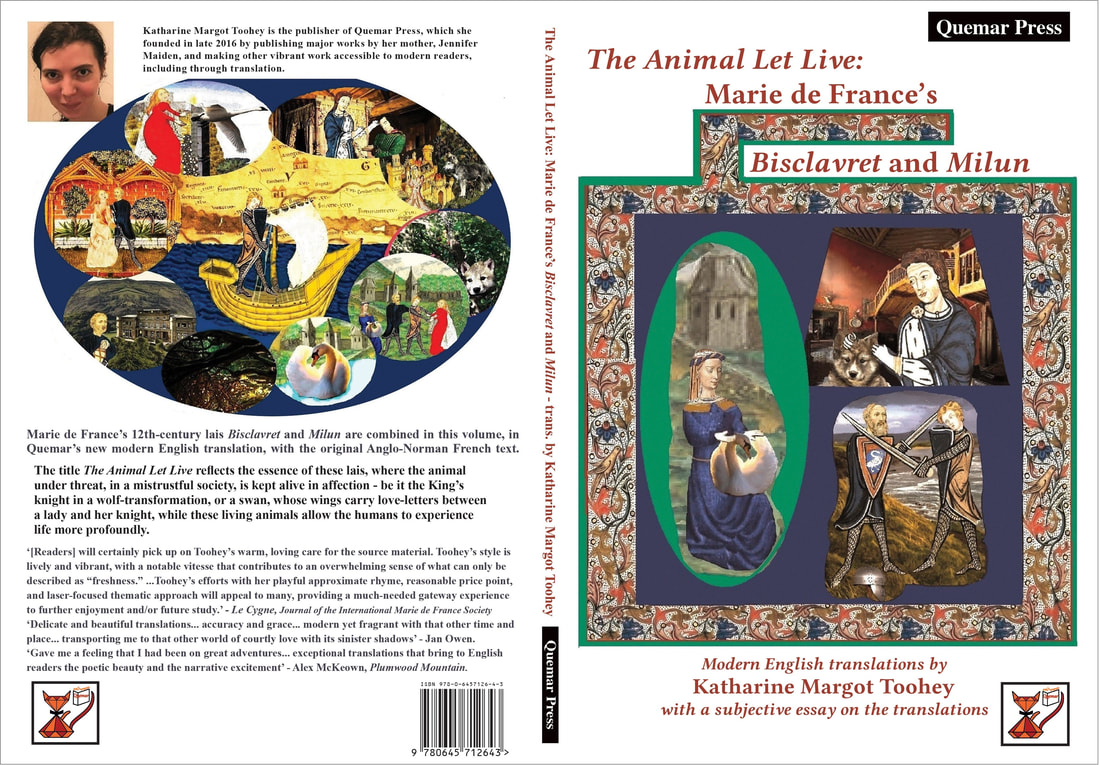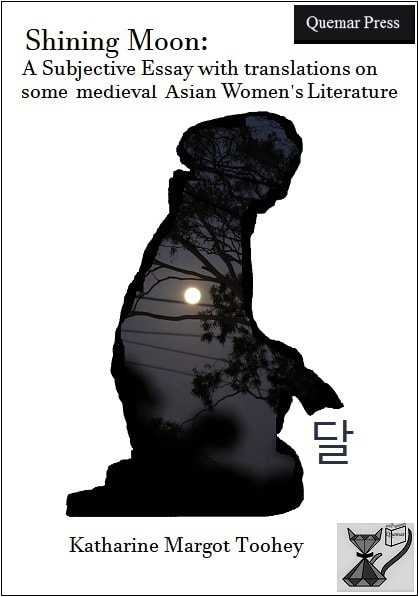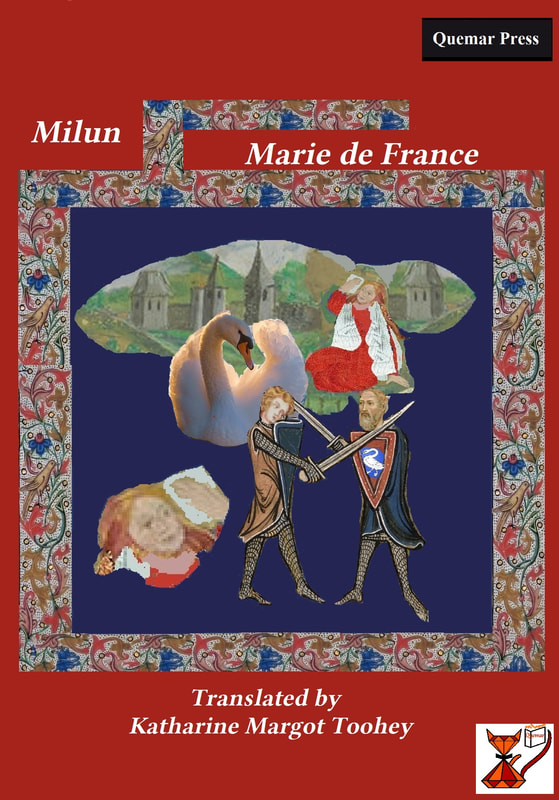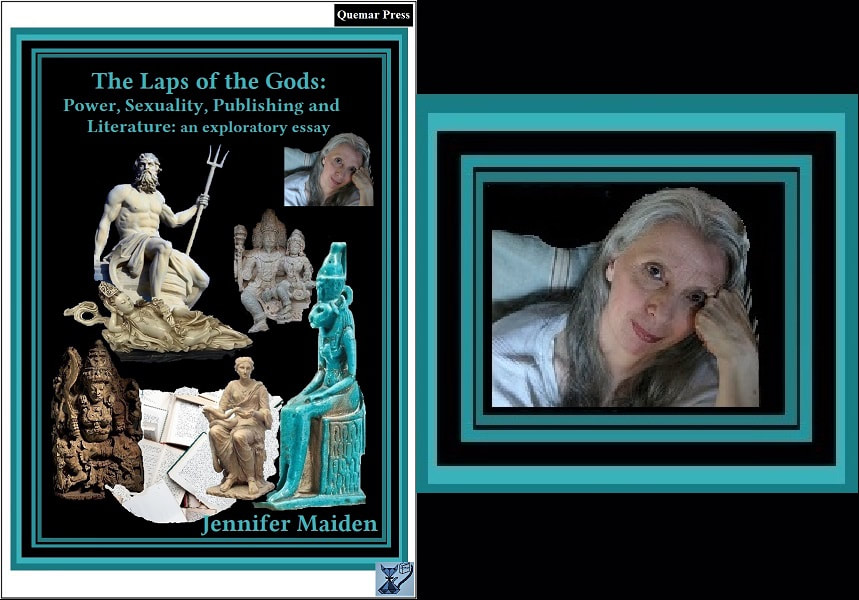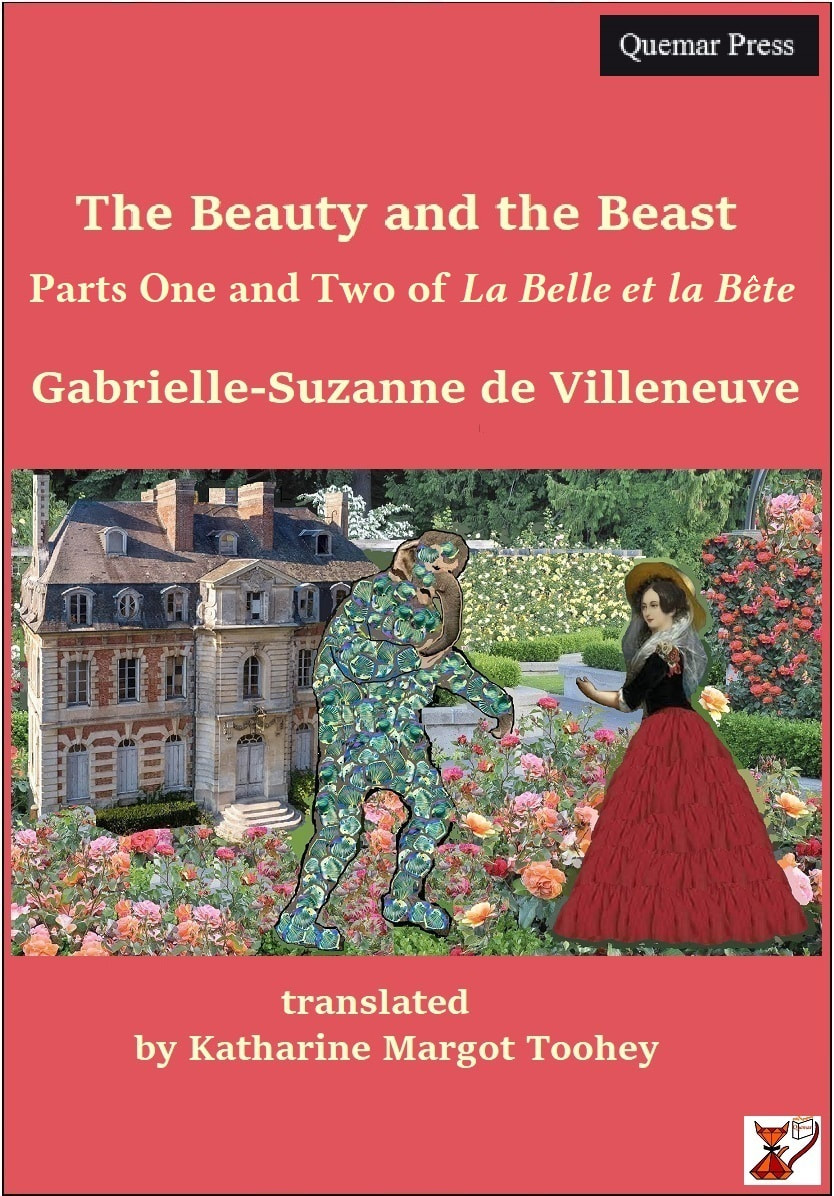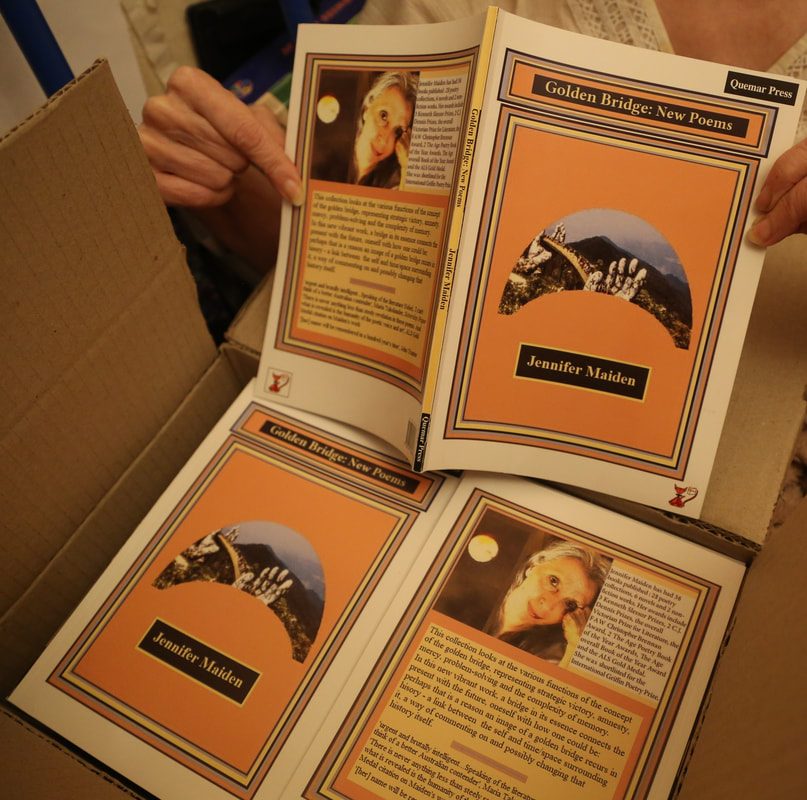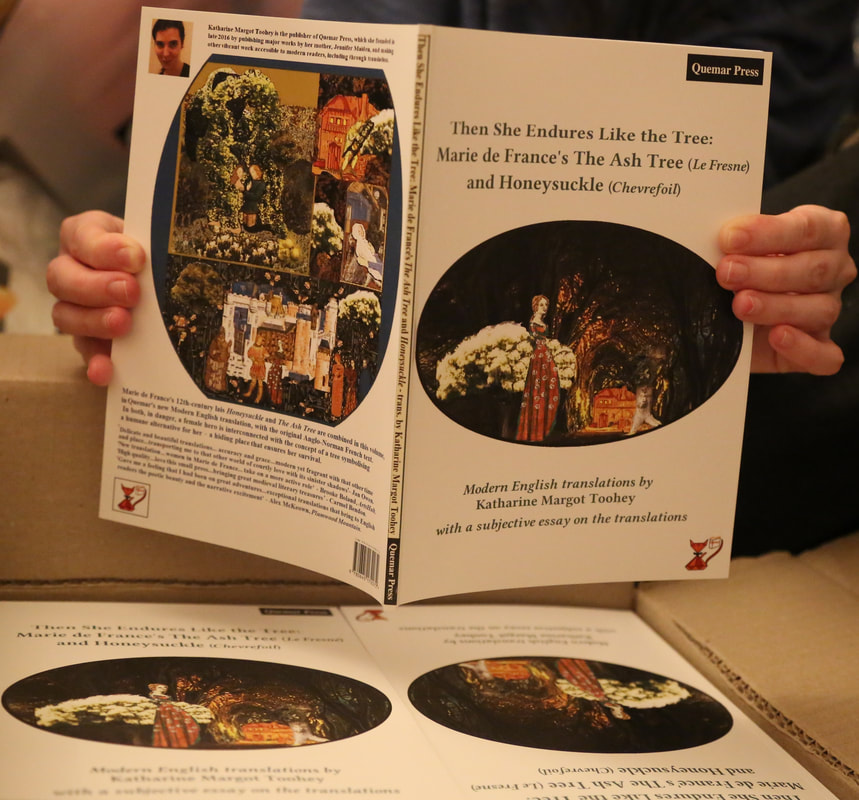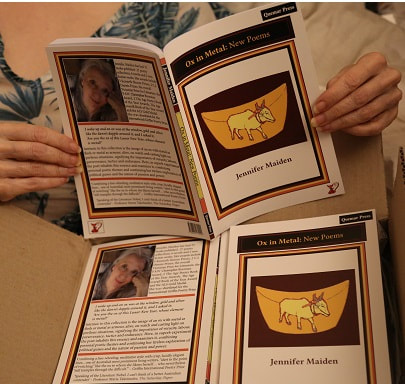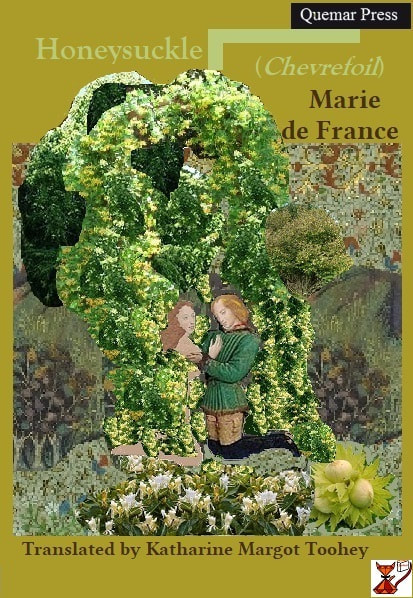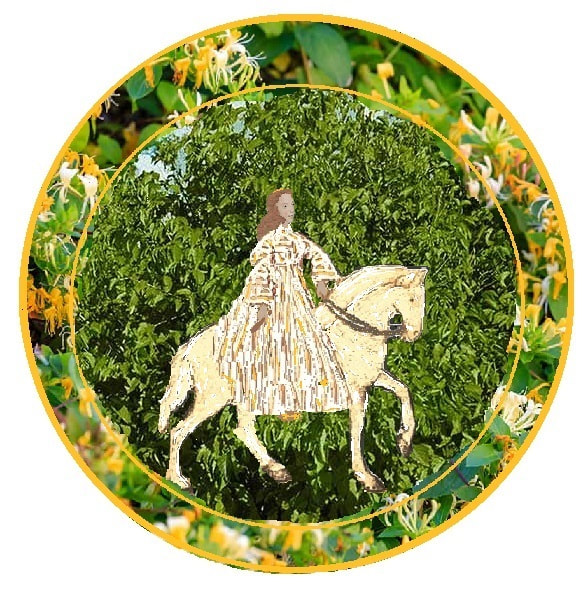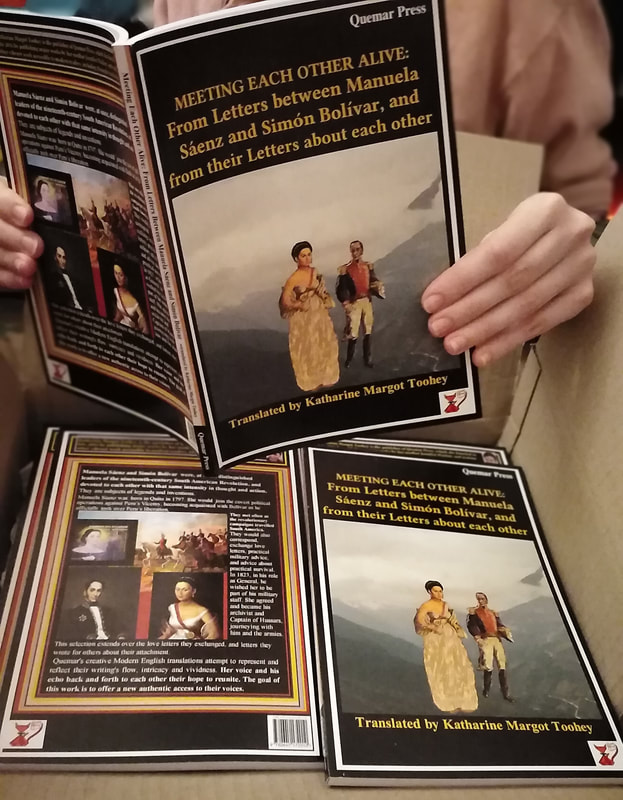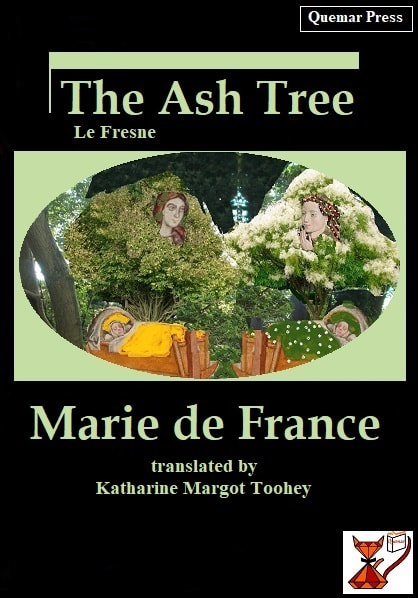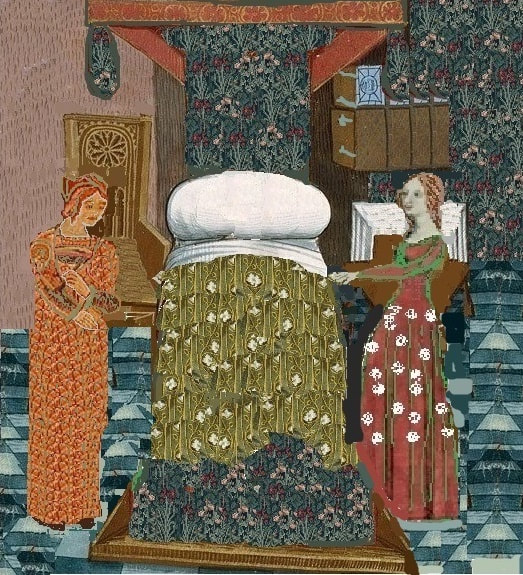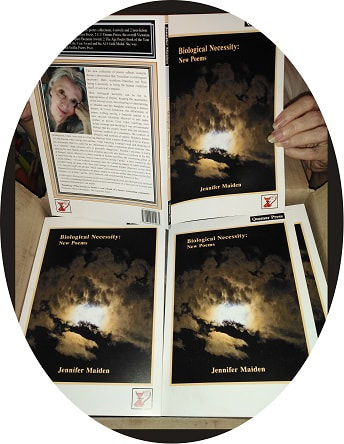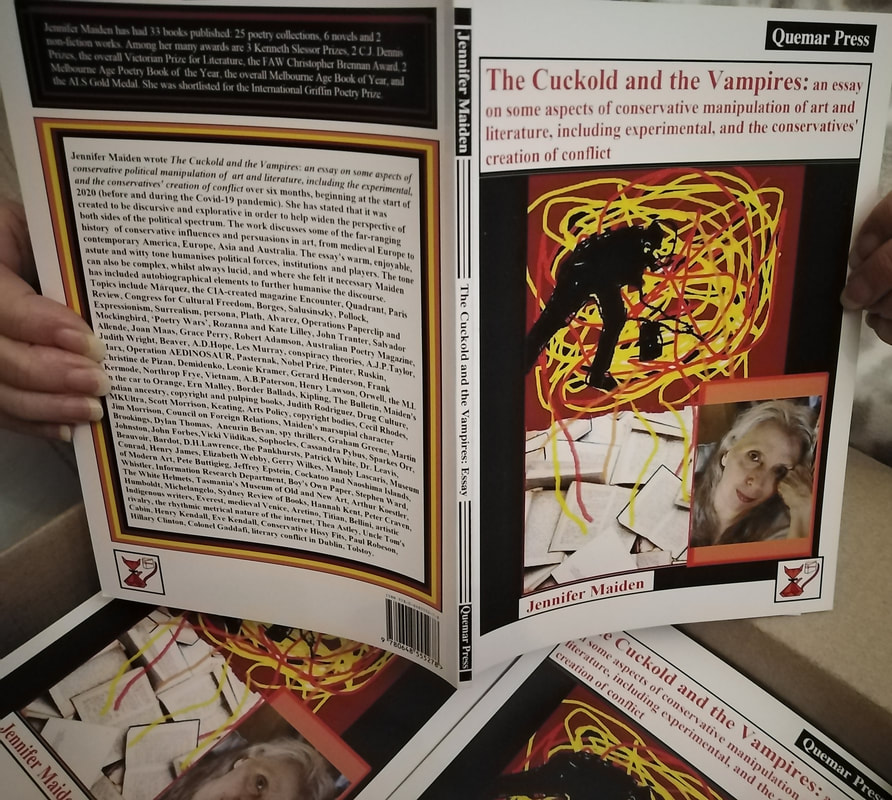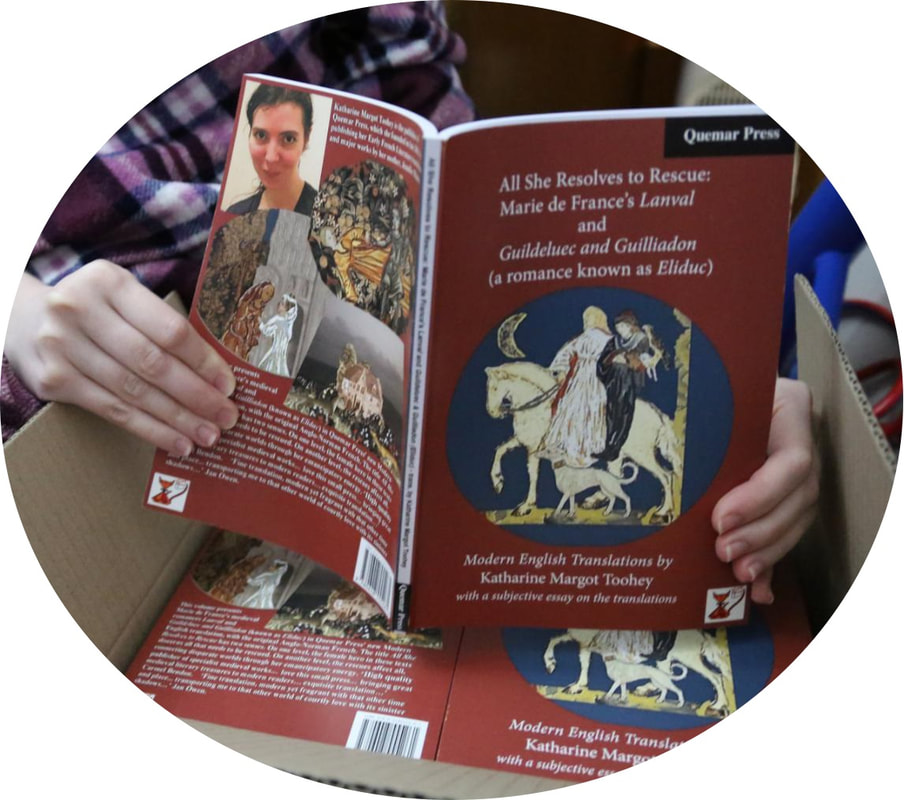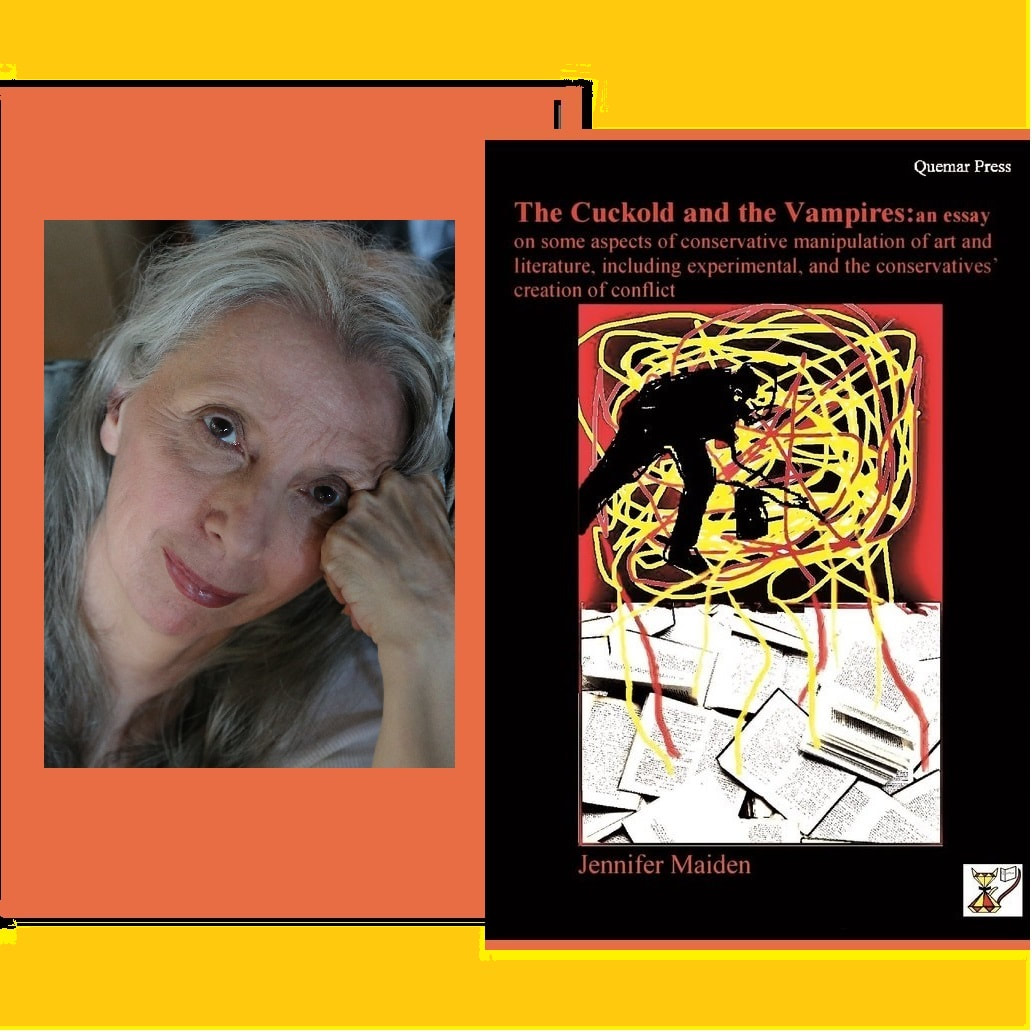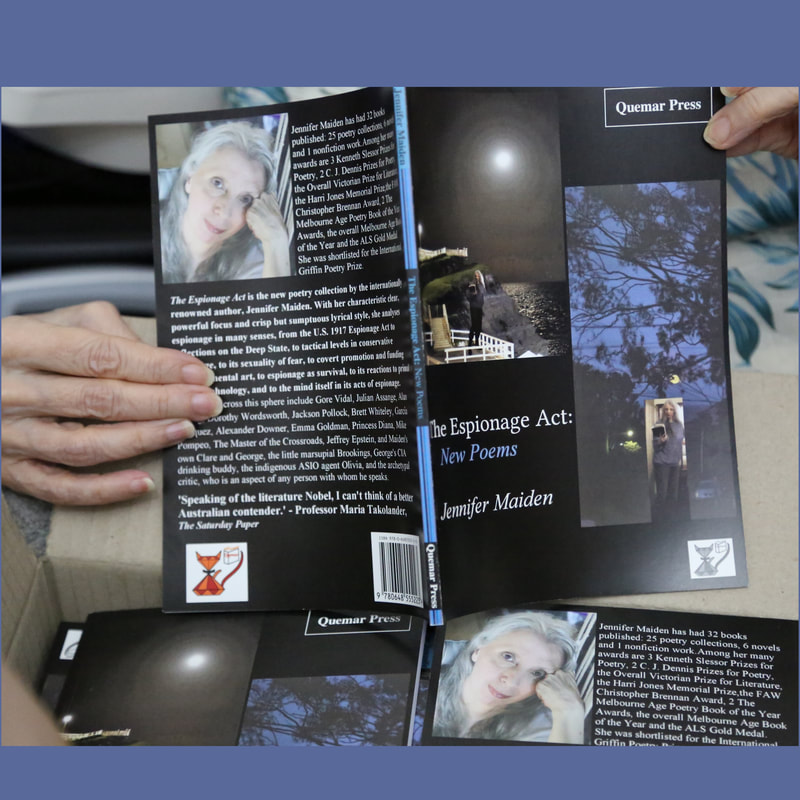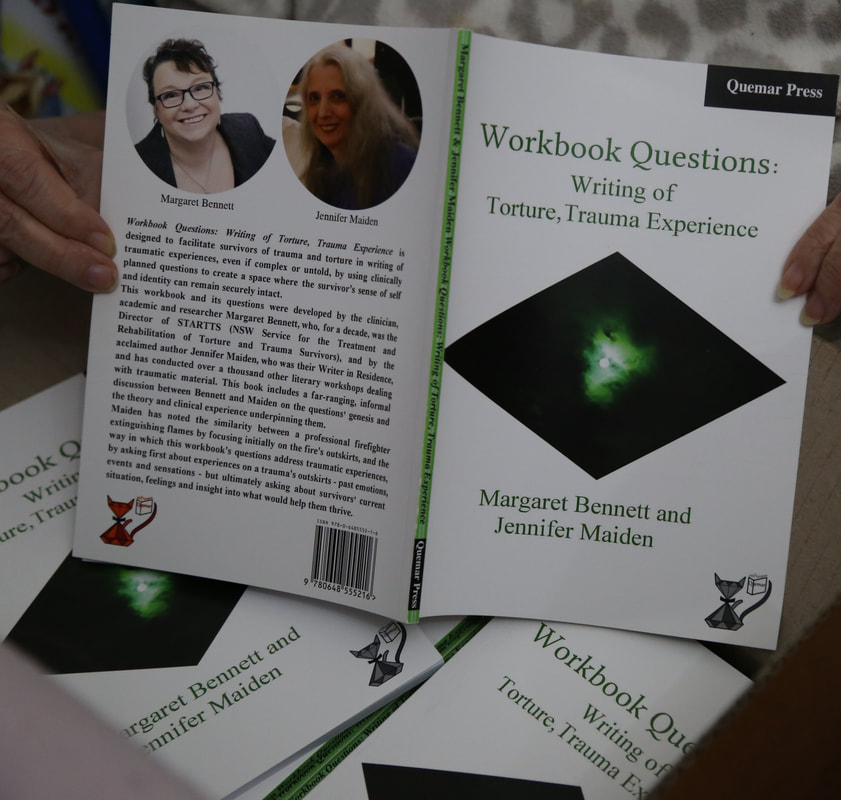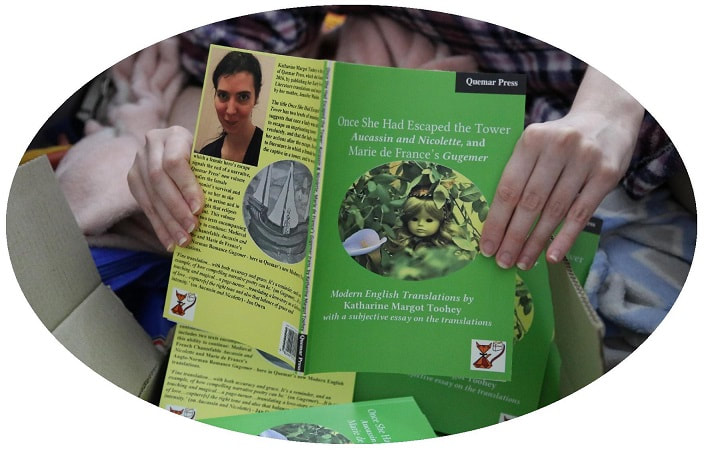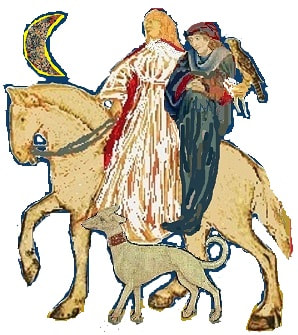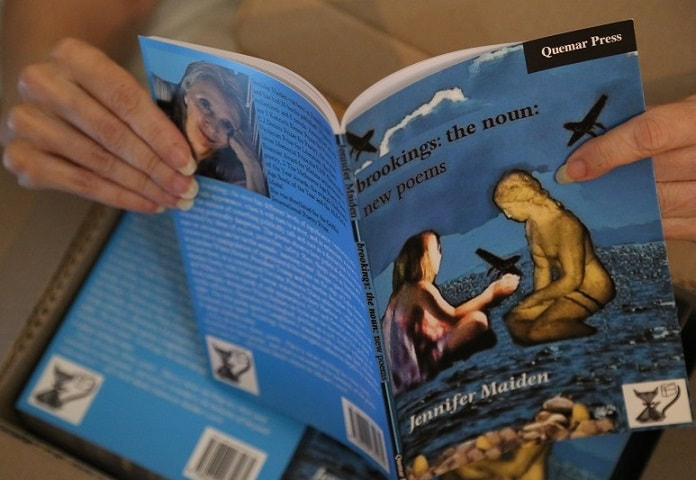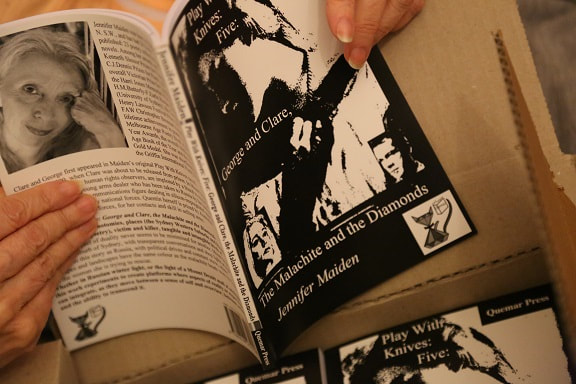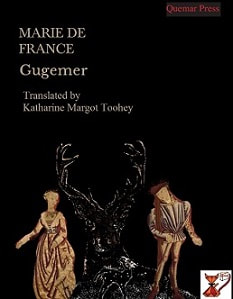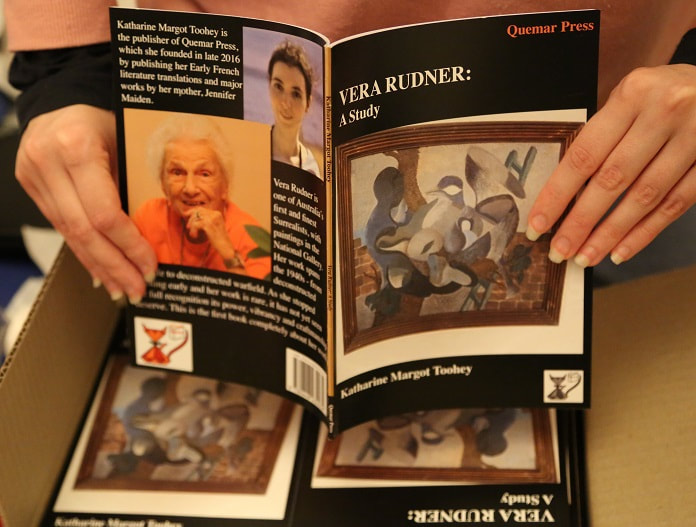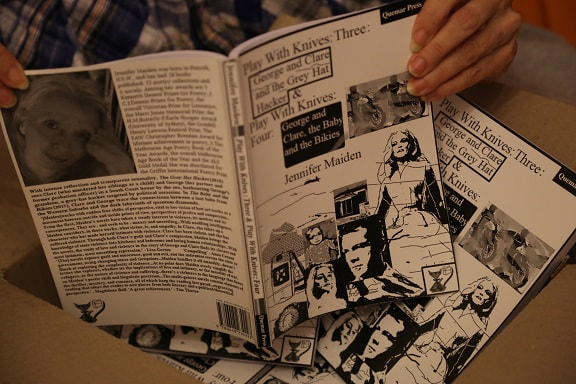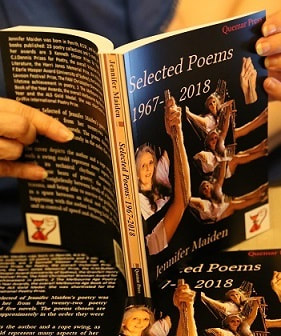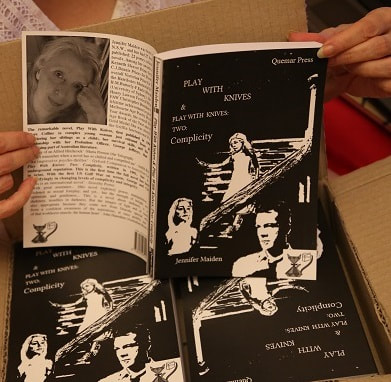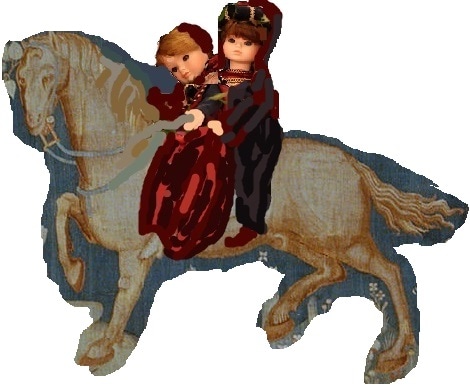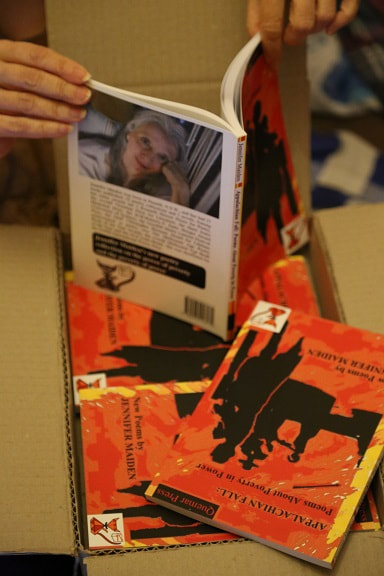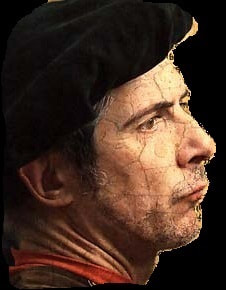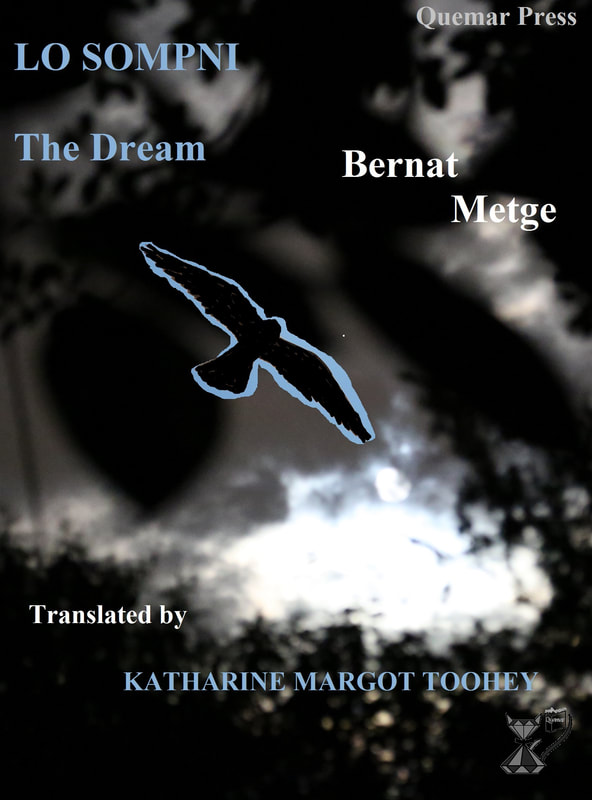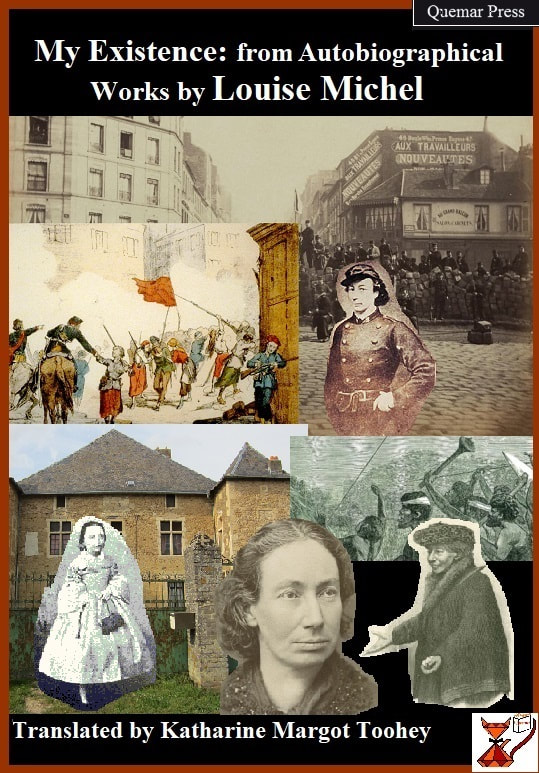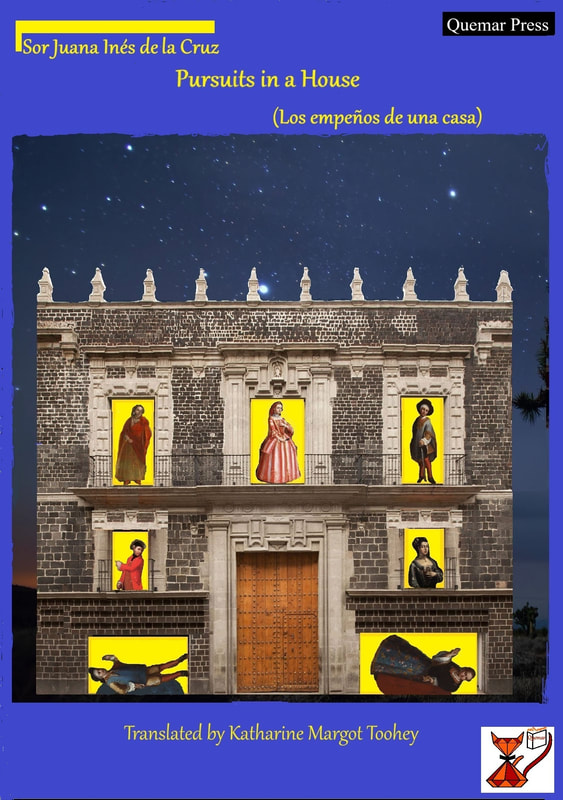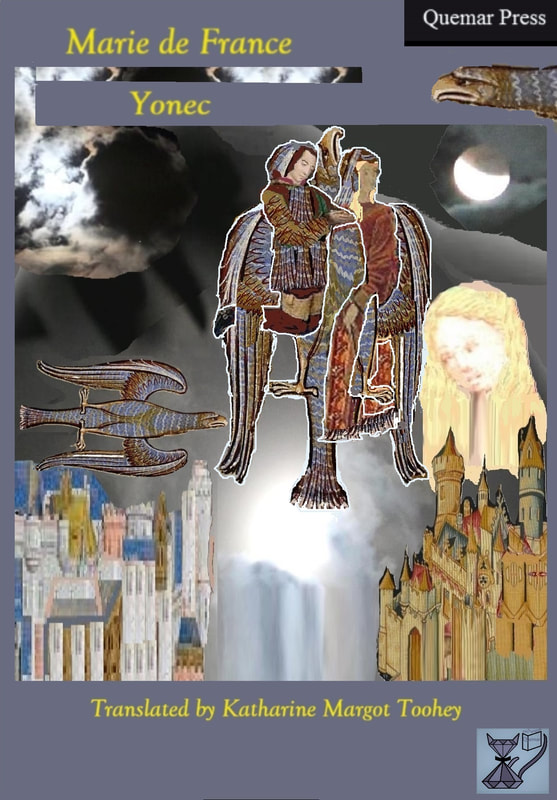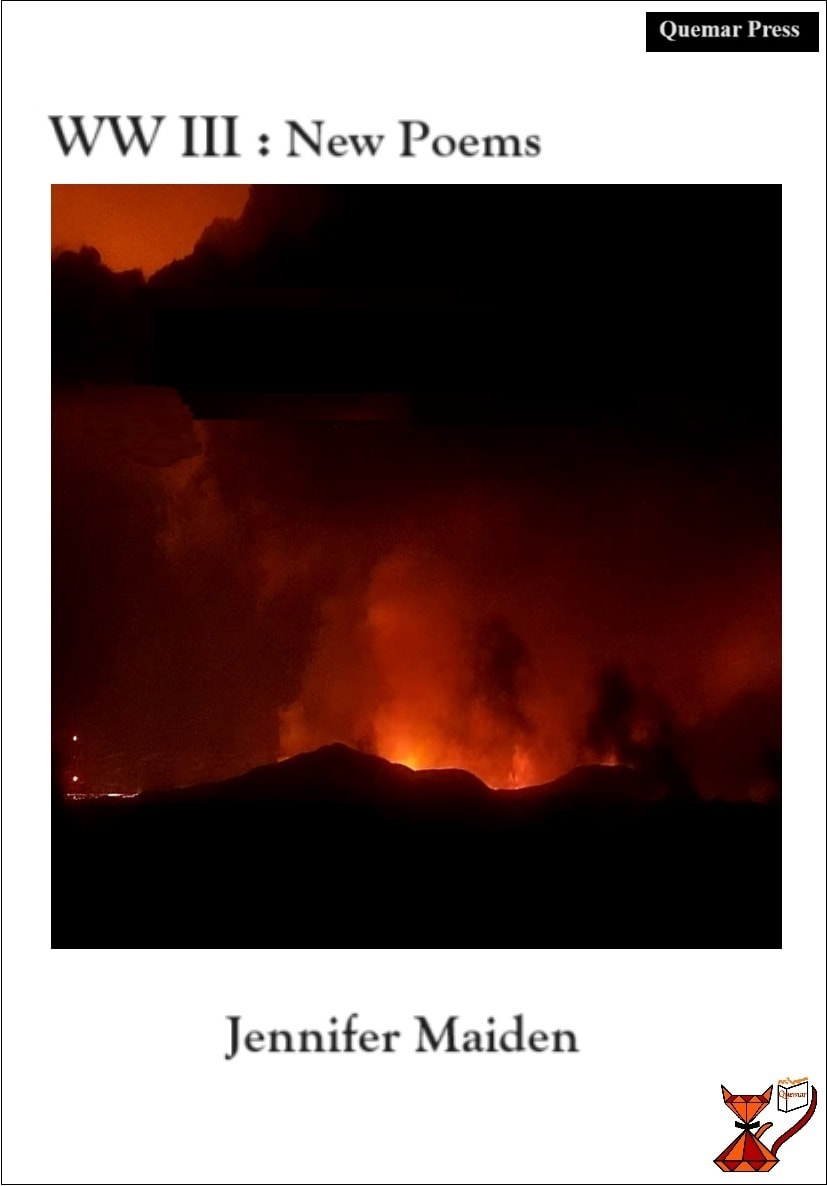|
Quemar Press has copies of The China Shelf: New Poems - Jennifer Maiden's much-requested new collection - in stock and they can be purchased now.
More information and Quemar's full Press Release are on the Books for Purchase page. Extract from Quemar's Press Release: In a new rule-changing level of discourse, in this unique and peerless collection, a China Shelf is at once a location threatened by Australian nuclear submarines, and a space for the necessary ornaments of civilisation, whether they are artifacts, human rights or memory. Here, this is a symbolic space also represented by the concept of a physical china shelf. The multifaceted artifacts on the China Shelf manifest throughout the poems. In one sense, they are described as physical objects on a shelf, able to be placed, touched, appreciated and analysed. On it, models of nuclear submarines and military vehicles are as accessible as its exquisite ornaments, relaxed Art Deco nudes, Chinese lions, Tang horses, figurines of Robert Burns and dancers in red tones created with gold, water-carrier or arched Chinese ships. In another sense, such objects have counterparts in the narratives... In a further sense, the objects symbolise tangible aspects of memory: Let’s say the china shelf in this poem represents just the antique memory full of madeleines… In contrast, on a profound level such objects also symbolise intangible memory: Let us consider in the quietness of a poem what is held on the soul's china shelf when it boasts both ornament and artifice in the name of memory, so that artificial intelligence is human as it always was, always a matter of the mind alternating stress and unstress to retain In keeping with Maiden’s description of the ornaments as ‘inherited or acquired manifestations of civilisation’, concepts of human rights are also on the China shelf... In this book, the elements of the china shelf have countless configurations. The China Shelf depicts the beauty, the strength, the continuity and the vulnerability of memory and civilisation. |
___________________________________________________________________________________________________________________________________________
|
The Animal Let Live: Marie de France’s Bisclavret and Milun - Quemar's new paperback - is available now
It can be purchased on the Books for Purchase page. From Quemar's Press Release: Marie de France's 12th-century lais Bisclavret and Milun are combined in this volume, in Quemar's new Modern English translation, with the original Anglo-Norman French text. The title The Animal Let Live reflects the essence of these lais, where the animal under threat, in a mistrustful society, is kept alive in affection - be it a knight suspended in a wolf-transformation, or a swan, whose wings carry every utterance in secret from a lady and knight in love but severed from each other.... In Bisclavret and Milun the animal remaining alive leads to the narrative's resolution.Within these texts, the animals grant new elements to the lives of those around them - whether that be the King's love, in wonder at the mysterious and beautiful animal from the forest, or every word between the lady and the knight, lost if not for a swan's living wings. |
___________________________________________________________________________________________________________________________________________
___________________________________________________________________________________________________________________________________________
|
Quemar Press' new Modern English translation of Milun, Marie de France's medieval French Romance, is available as a complete free download ebook with an ISBN and an Introduction on the Books page.
From Quemar's Preface: This lai explores the possibility of communicating directly with someone beloved kept distant by secrecy or social convention. In this work, a Lady and the knight Milun fell in love and had a son in secret. Under the threat of retribution and dishonour, she sent this child to live guarded and nurtured by her sister in Northumbria, sending with him a ring and a letter for him when he was an adult... Unaware, the Lady's father gives her away in marriage to a Baron. While the Baron keeps her under his close watch, the Lady and Milun live in love - speaking only by messages hidden in a pet swan’s plumes - for twenty years, in the hope of meeting together again... Throughout, the characters’ written word seems to engender resolution at a later point in the narrative. Discourse can be aligned or at one with movement and trajectory. The letters exchanged at the speed of a swan between the Lady and Milun lead to their decision to search for their adult son, and ultimately their reunion, just as the letter the Lady writes to her son leads to the moment in which he and Milun recognise each other. In a similar way, the Lady’s first love letter to Milun leads to their meeting, and her message after her lord dies, asking Milun to come to her, reaches him unexpectedly, and leads to their life together with their son... |
___________________________________________________________________________________________________________________________________________
|
The new immersive and engaging overview of the interconnectivity of Publishing, Sexuality and Power - The Laps of the Gods: Power, Sexuality, Publishing and Literature: an exploratory essay by Jennifer Maiden can now be read as a free download book on the Books page. It has been completed and expanded by Maiden, and now has an ISBN. |
___________________________________________________________________________________________________________________________________________
|
As a New Year gift to our readers. we are happy to publish the original 18th- century The Beauty and the Beast (Parts One and Two of La Belle et la Bête by Gabrielle-Suzanne de Villeneuve), in our new Modern English translation, as a complete free download e-book with a Preface and ISBN on our Books page.
From Quemar's Preface: 'Villeneuve's extraordinary 18th-century French work, La Belle et la Bête, is underpinned by the idea of a female hero as she navigates things unknown to her, things kept from her, and shades of truth spoken to her in dreamscape. She has no other name or title but 'The Beauty', just as such attributes were included often in the titles of royalty. Raised as a Merchant's daughter, The Beauty's own royal heritage is not revealed to her until her adventure is concluding and she has achieved her goals. Initially, when her father is threatened by a Beast, she agrees to remain forever with it in its castle, in exchange for his life. Among the Castle’s enchantments for her, are dreams of an Unknown one, whom she loves and feels is also prisoner there. Exploring the layers of the castle and the layers of the realities and mysteries surrounding her, her character reaches new complexity and compassion as she feels growing affection for the Beast. In later adaptions of this story, the Beast is often placed under an enchantment to give it an opportunity to remedy a lack of empathy. In Villeneuve’s original text, however, the Beast is placed in the Palace by enchantment without a remedial pretext. On one level, the Beast and The Beauty might be seen as co-existing as equal prisoners there, in contrast to later versions that are sometimes compared to the ‘Stockholm Syndrome’ (in which a captive confuses their identity with their captor, leading the captive to become fond and loyal to the captor)...' |
___________________________________________________________________________________________________________________________________________
|
Golden Bridge - Jennifer Maiden's new poetry collection from Quemar Press - is available now.
It can be purchased on the Books for Purchase page. From Quemar's Press Release: This collection looks at the various functions of the concept and reality of the golden bridge, representing strategic victory, amnesty, mercy, problem-solving and the complexity of memory. In this vibrant new work, a bridge in its essence connects the present with the future, oneself with how one could be: perhaps that is a reason the image of a golden bridge reoccurs in history - a link between the self and time/space surrounding it, a way of commenting on and possibly changing that history itself. |
__________________________________________________________________________________________________________________________________________
|
More of the Press Release can be read beneath the book's cover image on the Books for Purchase page, where the book can be purchased. |
Then She Endures Like the Tree: Marie de France’s The Ash Tree (Le Fresne) and Honeysuckle (Chevrefoil) - Quemar Press' new paperback - is available now
From Quemar's Press Release: Marie de France's 12th-century lais Honeysuckle and The Ash Tree are combined in this volume, in Quemar's new Modern English translation, with the original Anglo-Norman French text. In both, in danger, a female hero is interconnected with the concept of a tree symbolising a humane alternative for her - a hiding place that ensures her survival. In literature and legend, a female hero sometimes transforms into a tree to remedy a problem, just as Daphne metamorphoses into a laurel tree, guarded against Apollo, or Barbara Allen's spirit is preserved in the briar that springs from her grave. In contrast, in Marie de France's The Ash Tree and Honeysuckle, the female heroes remain human and incarnate and take on aspects of a tree that shelters them. In these works, the metaphoric tree symbolising them is also something with which they can interact physically - branches that protected Fresne (The Ash Tree's hero) in darkness or a subversive forest that becomes a sanctuary for the Queen Iseult and her beloved in exile, the knight Tristan... These works let the truth in metaphor and the truth in reality be juxtaposed, allow new ways of perceiving the narrative's universe and the female hero - who is as enduring as any branch that encircles its own. |
___________________________________________________________________________________________________________________________________________
|
Quemar Press' new Modern English translation of Bisclavret (Werewolf), Marie de France's medieval French Romance, is available as a complete free download ebook with an ISBN and an Introduction on the Books page. From Quemar's Preface: Bisclavret is a re-imagining by Marie de France of traditional werewolf legends. This is a work where hierarchy between animals and humans can be demolished, and affection for an individual being (be it in an animal or human state) can be clear and unwavering. |
‘At this sight, the king had great fear,/called all his companions here,/saying: “Lords, come before,/come here to watch this wonder;/how this animal bows to me,/with a man’s sense, calling for mercy./For me, hunt those dogs back./Watch he isn't struck./This beast has understanding and reason./Act now; light us on./To the beast I grant rest,/for I'll hunt no more this forest.”’
In this lai's original text, the 'werewolf' has no monstrous or fearsome characteristics, but sleeps in his wolf form close by the king, who has a building affection for him. Here, the werewolf-knight is identical to an engaging and non-threatening wolf - similar to a wolf-cub. He is suspended in wolf-guise after his spouse had his clothes stolen to prevent him from turning into a knight again, leaving him forced to traverse the forest. There, the king is stunned at encountering this animal with a man’s reason and feels incapable of killing him in a hunt. He takes the wolf into shelter in the castle.
Marie de France, considered to be the earliest female French poet, constructed this lai from ancient Breton lais, originally translating them in the twelfth-century to Anglo-Norman French. While Quemar's Modern English translation is of all the original Anglo-Norman text, Marie de France's original Anglo-Norman is also included, juxtaposed with the translation. To reflect her tone, energy and structure, Quemar’s creative translation tries to preserve her four stresses to a line and suggest the couplet rhyme on the line’s end.
Marie de France also acts as the lai’s narrative voice, indicating levels of humour in the text and witty exaggerations...
...
In the original, Marie creates a remarkable level of clarity when the affection between the king and the werewolf-knight is unchanged by his form, affirming an underlying continuity of the self - regardless of state, regardless of situation.
__________________________________________________________________________________________________________________________________________
In this lai's original text, the 'werewolf' has no monstrous or fearsome characteristics, but sleeps in his wolf form close by the king, who has a building affection for him. Here, the werewolf-knight is identical to an engaging and non-threatening wolf - similar to a wolf-cub. He is suspended in wolf-guise after his spouse had his clothes stolen to prevent him from turning into a knight again, leaving him forced to traverse the forest. There, the king is stunned at encountering this animal with a man’s reason and feels incapable of killing him in a hunt. He takes the wolf into shelter in the castle.
Marie de France, considered to be the earliest female French poet, constructed this lai from ancient Breton lais, originally translating them in the twelfth-century to Anglo-Norman French. While Quemar's Modern English translation is of all the original Anglo-Norman text, Marie de France's original Anglo-Norman is also included, juxtaposed with the translation. To reflect her tone, energy and structure, Quemar’s creative translation tries to preserve her four stresses to a line and suggest the couplet rhyme on the line’s end.
Marie de France also acts as the lai’s narrative voice, indicating levels of humour in the text and witty exaggerations...
...
In the original, Marie creates a remarkable level of clarity when the affection between the king and the werewolf-knight is unchanged by his form, affirming an underlying continuity of the self - regardless of state, regardless of situation.
__________________________________________________________________________________________________________________________________________
|
Early copies of Ox in Metal: New Poems by Jennifer Maiden are available now for purchase on the Books for Purchase page
A 7 poem sampler (including the title poem) from these 28 poems can also be read by clicking on the cover on the Books for Purchase page. From Quemar's Press Release: I woke up and an ox was at the window, gold and silver like the dawn's dapple around it, and I asked it: 'Are you the ox of this Lunar New Year, whose element is metal?' Intrinsic to this collection is the image of an ox with metal as flesh or metal as armour, alive, on watch and casting light on perilous situations, signifying the importance of veracity, labour, perseverance, tactics and endurance. Here, in superb experiment, the poet inhabits this essence and examines it, combining personal poetic themes and continuing her tireless exploration of political guises and the nature of passion and power. |
__________________________________________________________________________________________________________________________________________
|
Quemar Press' new English translation of Marie de France's twelfth-century Anglo-Norman French Romance, Chevrefoil - Honeysuckle - is now a complete book with a Preface and an ISBN, and is available as a free download on our Books page.
From the Preface: [This work] seems to re-imagine the traditional tragic Romance of Iseult and Tristan, in a chosen catalytic space - deep in a forest where the heroes interlink in communication and affection: just as, Marie writes, the honeysuckle vine of the title entwines with hazel. |
__________________________________________________________________________________________________________________________________________
|
Devoted to leading a revolution, devoted to each other. Their passion freed a continent.
Meeting Each Other Alive - Quemar's new translations from the letters between Manuela Sáenz and Simón Bolívar, great leaders of the nineteenth-century South American Revolution - is available now. More information and a new Sampler are on the Books for Purchase page. From Quemar's Press Release: Throughout their letters, whether in spontaneous affection, finding solutions to slander and untruths, or defining facets of revolution, their voices never sound disillusioned. Neither of them died in disillusionment. Making plans to travel with Sáenz, Bolívar died in 1830. After Bolívar's death, Sáenz survived exile and went to the North of Peru, where she decided to live in Paita, on the coast. She gave her correspondence with Bolívar to one of his generals, O'Leary, who was writing a biography. With her long career as his archivist, Captain of Hussars and, ultimately, Colonel, she knew the importance of word and action. As a revolutionary, she knew the importance of incorruptible voices in history. |
__________________________________________________________________________________________________________________________________________
|
Quemar Press' new English translation of Marie de France's twelfth-century Anglo-Norman French Romance, Le Fresne - The Ash Tree - is now a complete book with a Preface and an ISBN, and is available as a free download on our Books page.
In this lai, spontaneous affection overcomes conceptual rejection. |
__________________________________________________________________________________________________________________________________________
|
Biological Necessity - a 2021 collection of new poems by Jennifer Maiden - is officially released now and available for purchase on the Books for Purchase page From Quemar's Press Release: This new collection of poems reflects Aneurin Bevan's observation that 'Socialism is a biological necessity'. Here, socialism branches out from being a necessity to being the human condition itself, or survival's impulse... In this space, biological necessity is not only something physical, psychological or spiritual - it is also something empathetic and practical, the elements of a discourse in lyricism and humanity between poet and reader. |
__________________________________________________________________________________________________________________________________________
|
Quemar Press' new paperback is now available, Jennifer Maiden's The Cuckold and the Vampires: an essay on some aspects of conservative political manipulation of art and literature, including the experimental, and the conservatives' creation of conflict. It can be purchased from the Books for Purchase page.
From Quemar's Press release: ...She has stated that it was created to be discursive and explorative in order to help widen the perspective of both sides of the political spectrum. The work discusses some of the vast history of conservative influences and persuasions in art, from medieval Europe to contemporary America, Europe, Asia and Australia. The essay's warm, enjoyable, astute and witty tone humanises political forces, institutions and players.... This essay acts as a platform to give an artistic overview, to deconstruct microcosmal, interpersonal powerplay and rejection. In spite of any labyrinth or lure, here neither art nor artist are lessened by the impact of political manipulation, and candid respect for art is at one with the artist's survival. |
__________________________________________________________________________________________________________________________________________
|
All She Resolves to Rescue is now available - a paperback presenting Marie de France's medieval romances Lanval and Guildeluec and Guilliadon (known as Eliduc) in Quemar Press' new Modern English translation, with the original Anglo-Norman French, and a subjective essay on the translations. The paperback can be purchased on the Books for Purchase page.
From Quemar's Press Release: The title All She Resolves to Rescue has two senses. On one level, the female heroes in these texts discern all that needs to be rescued. On another level, the rescues affect all, connecting disparate worlds surrounding them. Here, a sprite-like Lady can tell the Knight Lanval that she could never appear visible before him again if he let anyone know of their affection, but when her existence and her actual presence are the only things that can rescue him from the Court's corruption, she rides openly through the city, having decided to speak unconcealed before Lanval and the Court. In a similar way, with similar emancipatory energy, Guildeluec - the wife of the titular Knight Eliduc - can decide to revive the Lady whom Eliduc loves, who was hidden to her until that day... |
__________________________________________________________________________________________________________________________________________
|
Jennifer Maiden's new 75-page The Cuckold and the Vampires: an essay on some aspects of conservative political manipulation of art and literature, including the experimental, and the conservatives' creation of conflict is now available on the Books page with an ISBN as a free download.
Maiden has observed: ‘One purpose of the essay is to try to warn against microcosmic unwariness in a situation where overwhelming macrocosmic forces are at play…there are all sorts of twists and turns during the course of my essay. My focus is on the wider causes of damage and the nature of power in art… we will continue to try here to respect what Pinter considered mandatory and to smash the mirror of the microcosm, to try to look at the macrocosm behind it.’ The essay is immense in scope and immensely enjoyable, astute and witty. |
__________________________________________________________________________________________________________________________________________
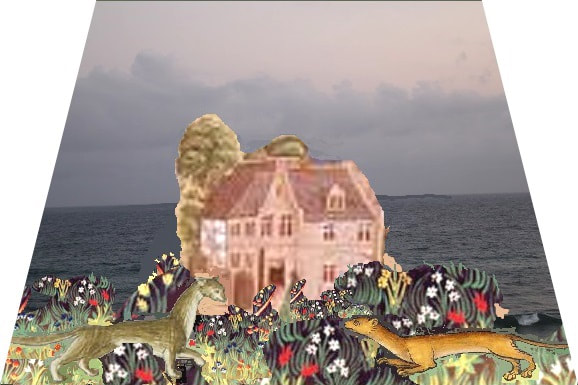
Quemar Press' new Modern English translation of Marie de France's Guildeluec and Guilliadon ( a romance known as Eliduc) with a new Preface by the translator now has an ISBN, and is available as a free download on the Books page.
From Quemar Press' Preface:
'Near the story's conclusion, the narrator explains '"they all made such effort/...so made their ending beautiful completely". Here, effort belongs to both natural force and protagonist, whether it is a storm forcing necessary truth to be revealed, or someone actively on watch over one she resurrected. Whether in a wave-torn ship, or unfolding and enfolding forest depths, this is a story where humane survival, affection and rescue come from action and deliberation, to surpass societal concepts such as roles in relationships, marriage and rivalry.'
From Quemar Press' Preface:
'Near the story's conclusion, the narrator explains '"they all made such effort/...so made their ending beautiful completely". Here, effort belongs to both natural force and protagonist, whether it is a storm forcing necessary truth to be revealed, or someone actively on watch over one she resurrected. Whether in a wave-torn ship, or unfolding and enfolding forest depths, this is a story where humane survival, affection and rescue come from action and deliberation, to surpass societal concepts such as roles in relationships, marriage and rivalry.'
___________________________________________________________________________________________________________________________
|
Jennifer Maiden's collection The Espionage Act: New Poems (2020) - available now
It can be purchased on the Books for Purchase page. From Quemar's Press Release: The Espionage Act is the new poetry collection by the internationally renowned author, Jennifer Maiden. With her characteristic clear, powerful focus and crisp but sumptuous lyrical style, she analyses espionage in many senses - from the U.S. 1917 Espionage Act to reflections on the Deep State, to tactical levels in conservative espionage, to its sexuality of fear, to covert promotion and funding of experimental art, to espionage as survival, and to espionage's reactions to primal digital technology. Maiden also describes the mind itself in its multifaceted acts of espionage. |
__________________________________________________________________________________________________________________________________________
|
Quemar Press' new paperback, Workbook Questions: Writing of Torture, Trauma Experience, by Margaret Bennett and Jennifer Maiden, is now available. It can be purchased on the Books for Purchase page. Workbook Questions: Writing of Torture, Trauma Experience is designed to facilitate survivors of trauma and torture in writing of traumatic experiences, even if complex or untold, by using clinically planned questions to create a space where the survivor's sense of self and identity can remain securely intact. |
__________________________________________________________________________________________________________________________________________
Quemar Press' lively new far-reaching paperback, Once She Had Escaped the Tower, is available now, and can be purchased on the Books for Purchase page.
From Quemar's Press Release:
The title 'Once She Had Escaped the Tower' has two meanings: once a lady escaped an imprisoning tower resolutely; and the lady continued her actions after escape. In contrast to literature in which a female hero dies captive in a tower, and to works in which her escape signals the end of narrative, Quemar Press’ new volume shows female protagonists’ survival, and casts light on them as they continue. This volume includes two texts encompassing this ability to continue: Medieval French chantefable 'Aucassin and Nicolette' and Marie de France’s Anglo-Norman Romance 'Gugemer'. Quemar's Modern English translations are juxtaposed with the early French texts. This volume also includes a subjective essay by the translator.
From Quemar's Press Release:
The title 'Once She Had Escaped the Tower' has two meanings: once a lady escaped an imprisoning tower resolutely; and the lady continued her actions after escape. In contrast to literature in which a female hero dies captive in a tower, and to works in which her escape signals the end of narrative, Quemar Press’ new volume shows female protagonists’ survival, and casts light on them as they continue. This volume includes two texts encompassing this ability to continue: Medieval French chantefable 'Aucassin and Nicolette' and Marie de France’s Anglo-Norman Romance 'Gugemer'. Quemar's Modern English translations are juxtaposed with the early French texts. This volume also includes a subjective essay by the translator.
__________________________________________________________________________________________________________________________________________
|
Quemar's complete Modern English translation of Lanval, Marie de France's Medieval French Romance, is now available as a free download on our Books page with an introduction.
|
__________________________________________________________________________________________________________________________________________
brookings: the noun, Jennifer Maiden's new poetry collection from Quemar Press, is now available in paperback and electronic editions from the Books for Purchase page.
__________________________________________________________________________________________________________________________________________
__________________________________________________________________________________________________________________________________________
The final novel in Jennifer Maiden's Play With Knives Quintet, George and Clare, the Malachite and the Diamonds, is available now from Quemar Press.
At the Books for Purchase page, you can find information on how to purchase or obtain it.
From Quemar's Press release:
The last novel in Jennifer Maiden's Play With Knives Quintet, George and Clare, the Malachite and the Diamonds experiments across poetry, prose, style, person, action and sense of self.
Clare was the central character in what the Oxford Companion to Australian Literature calls Maiden's 'impressive' first Play With Knives novel. Set in Sydney's Western Suburbs, it was first published in 1990, and centres on Clare and George's survival as Clare is released from prison. The Quintet outlines the growth of these characters...
Whether in Russian winter light, or the light of a Mount Druitt mall at midnight, this work experiments to create platforms where aspects of reality or experience can integrate, as they move between a sense of self and overview, between action and the ability to transcend it.
__________________________________________________________________________________________________________________________________________
At the Books for Purchase page, you can find information on how to purchase or obtain it.
From Quemar's Press release:
The last novel in Jennifer Maiden's Play With Knives Quintet, George and Clare, the Malachite and the Diamonds experiments across poetry, prose, style, person, action and sense of self.
Clare was the central character in what the Oxford Companion to Australian Literature calls Maiden's 'impressive' first Play With Knives novel. Set in Sydney's Western Suburbs, it was first published in 1990, and centres on Clare and George's survival as Clare is released from prison. The Quintet outlines the growth of these characters...
Whether in Russian winter light, or the light of a Mount Druitt mall at midnight, this work experiments to create platforms where aspects of reality or experience can integrate, as they move between a sense of self and overview, between action and the ability to transcend it.
__________________________________________________________________________________________________________________________________________
Quemar's full Modern English translation of Gugemer, Marie de France's Medieval French Romance, is now available on our Books page with an introduction. It is a free download.
Quemar Press' unique study of the post-war Surrealist artist, Vera Rudner, is now available for purchase on the Books for Purchase page.
__________________________________________________________________________________________________________________________________________
__________________________________________________________________________________________________________________________________________
Play With Knives: Three & Play With Knives: Four - Jennifer Maiden's recent, cutting-edge novels in poetry and prose - are available in one paperback volume from Quemar Press.
It is available for purchase on the Books For Purchase page.
____________________________________________________________________________________________
It is available for purchase on the Books For Purchase page.
____________________________________________________________________________________________
Jennifer Maiden's awaited new selected from Quemar Press, Selected Poems 1967-2018 is now available for purchase on the Books for Purchase Page.
___________________________________________________________________________________________________________________________
Jennifer Maiden's Play With Knives & Play With Knives: Two: Complicity in one 296 page paperback volume - now released from Quemar Press.
It can be purchased on our Books for Purchase page for $21.00 (Australian) with free postage worldwide.
It can be purchased on our Books for Purchase page for $21.00 (Australian) with free postage worldwide.
The complete novel, Play With Knives: Four: George and Clare, the Baby and the Bikies by Jennifer Maiden is now available as a free download from the Books page.
___________________________________________________________________________________________________________________________
___________________________________________________________________________________________________________________________
The complete Medieval French Chantefable, Aucassin et Nicolette, translated and photo-illustrated by Katharine Margot Toohey, is now available as a free download on the Books page.
___________________________________________________________________________________________________________________________
Following support and requests from our readers, complete advance copies of Jennifer Maiden's new 150-page, 40-poem collection, Appalachian Fall: Poems About Poverty in Power, are now available for purchase from Quemar Press in our own exclusive print and electronic editions.
The editions can be purchased from our Books for Purchase page.
We have received several queries about the nature of the purchase. The advance copies are complete ones and the same as they will be in a shop. If in a shop, the Recommended Retail Price will be at least $21.00 and the electronic edition will not be included.
We are offering the book and download for $18.50, and the download by itself for $5.00. We are not charging postage anywhere. We are posting the book through Australia Post mail as soon as the order is placed, and it has always been received very promptly (there have been inquiries as to whether these were only advance orders). If the purchaser does not wish to use PayPal, other arrangements such as cheque can be made via our contact page, and we have already been happy to do so.
To clarify further, the collection has 22 more poems than the sampler, which can still be downloaded through the cover image on the Books for Purchase page. In the collection, but not in the sampler, are new poems such as those on Brigitte Bardot, Nora Barnacle, Bruce Beaver, Christopher Brennan, Vera Rudner, polar bears, carbon credits, Twin Peaks, May Holman, Carols at Kings, the poem as essay, Appalachian terrors, mountaintop mining and extraordinary autobiographical pieces.
The editions can be purchased from our Books for Purchase page.
We have received several queries about the nature of the purchase. The advance copies are complete ones and the same as they will be in a shop. If in a shop, the Recommended Retail Price will be at least $21.00 and the electronic edition will not be included.
We are offering the book and download for $18.50, and the download by itself for $5.00. We are not charging postage anywhere. We are posting the book through Australia Post mail as soon as the order is placed, and it has always been received very promptly (there have been inquiries as to whether these were only advance orders). If the purchaser does not wish to use PayPal, other arrangements such as cheque can be made via our contact page, and we have already been happy to do so.
To clarify further, the collection has 22 more poems than the sampler, which can still be downloaded through the cover image on the Books for Purchase page. In the collection, but not in the sampler, are new poems such as those on Brigitte Bardot, Nora Barnacle, Bruce Beaver, Christopher Brennan, Vera Rudner, polar bears, carbon credits, Twin Peaks, May Holman, Carols at Kings, the poem as essay, Appalachian terrors, mountaintop mining and extraordinary autobiographical pieces.
___________________________________________________________________________________________________________________________
In 2024, Quemar will publish a new English translation of Bernat Metge's late fourteenth century Catalan masterpiece, Lo Sompni (known as 'Lo Somni' in modern Catalan). This story about official persecution is a precursor to works such as Orwell's 1984.
A 46th preview, now comprising Books One and Two and beginning the Third Book of Lo Sompni (The Dream), is available by clicking on the cover picture below.
Imprisoned in a dangerous setting for the murder of King John the First, Metge described spectral conversations with the dead King so that the text would persuade society of Metge's innocence. The intricate metaphysical debate in the dialogue reinforced the recognition that Metge was not regarded as guilty by the late King. There was also deliberate contextual irony in that the Metge persona continued to debate the existence of the spiritual afterlife with the vibrant spirit of the King, Metge then having moved on to the subject of the survival of animals' souls, for which survival he argued against the King, if still needing to display deference. There was a new facet of irony here, as the reader already knew that the King is accompanied by spectral birds and hounds. Whilst Metge at last appeared to accept the King's more orthodox position, the work allowed him to present his own broader humane perceptions in a safe context. The scene was set for their dialogue to continue, although the King warned Metge to be succinct, as the King could not stay long. In Book Two, the concept becomes even more direct and daring, as Metge begins to question the King about the circumstances of the King's death, and the nature of death and fear. The King then recounts his experience in trying to justify his position in the medieval Papal Schism to the Devil, before being assigned to Purgatory. The Humanist Metge continues to use traditional medieval theology to give verisimilitude to the King's situation in persuading the audience of the work's supposedly orthodox nature, and Metge's innocence of killing the King, whilst Metge's own persona remains courteously questioning about the theology. The King is given more verisimilitude by his recounting of his own debate with the Prince of Evil Spirits about Papal conflict between Rome and Avignon. In this, the King describes learning that his own involvement and lack of impartiality in that factional Schism encouraged it for selfish reasons, when the conflict should have been democratically controlled. The intricate narrative continues as Metge recounts the King's story of how the Virgin Mary argued against the Prince of Evil Spirits so that the King's soul was saved for Purgatory, although all the souls of earthly Princes, including the King's father, must remain there until the Schism ends. As Metge creates this narrative, a driving purpose of it is to build verisimilitude and a sense Metge's innocence through the dialogue with the authoritative but affectionate voice of the King. The dialogue then convincingly develops the strength of Metge's relationship with the King, who asks Metge to construct this narrative and to reassure the surviving Queen Violant and Princess Yolande (who was later to be known as the 'Queen of Four Kingdoms' and sponsor of Joan of Arc) about the King's circumstances in purgatory. Book Two concludes as Metge is introduced to to the mysterious men who accompany the King: the old man, Tiresias, and the young man, Orpheus. At the beginning of the Third Book, Orpheus tells his story to Metge, describing his loss but then his lesser known reunion with Eurydice and his continuing existence with her - resolving the traditionally tragic narrative of Orpheus and Eurydice. Metge then debates with Tiresias who argues that the mind is scattered by love for a woman. In the 44th Preview, Metge in his dream asks Orpheus to describe the Underworld, and Orpheus responds in terms of classical concepts derived from the Ancients and Dante, leading Metge to suspect that Orpheus' language is more literary and poetic than accurate, and allowing the Metge persona to once again assume a questioning role, and Metge as author to display his own erudition and convey it in eloquent medieval Catalan. In the 45th preview, Orpheus continues to describe the Inferno, and in that description the work paraphrases Dante, perhaps to illustrate Metge's erudite humanism and to distance the persona from the narrative and reinforce the indirect dreamlike nature of the events.In the 46th preview, the description of the Inferno continues, including a depiction of the fate of those who accept money to betray their motherland, alter legislation and misuse the law.
A 46th preview, now comprising Books One and Two and beginning the Third Book of Lo Sompni (The Dream), is available by clicking on the cover picture below.
Imprisoned in a dangerous setting for the murder of King John the First, Metge described spectral conversations with the dead King so that the text would persuade society of Metge's innocence. The intricate metaphysical debate in the dialogue reinforced the recognition that Metge was not regarded as guilty by the late King. There was also deliberate contextual irony in that the Metge persona continued to debate the existence of the spiritual afterlife with the vibrant spirit of the King, Metge then having moved on to the subject of the survival of animals' souls, for which survival he argued against the King, if still needing to display deference. There was a new facet of irony here, as the reader already knew that the King is accompanied by spectral birds and hounds. Whilst Metge at last appeared to accept the King's more orthodox position, the work allowed him to present his own broader humane perceptions in a safe context. The scene was set for their dialogue to continue, although the King warned Metge to be succinct, as the King could not stay long. In Book Two, the concept becomes even more direct and daring, as Metge begins to question the King about the circumstances of the King's death, and the nature of death and fear. The King then recounts his experience in trying to justify his position in the medieval Papal Schism to the Devil, before being assigned to Purgatory. The Humanist Metge continues to use traditional medieval theology to give verisimilitude to the King's situation in persuading the audience of the work's supposedly orthodox nature, and Metge's innocence of killing the King, whilst Metge's own persona remains courteously questioning about the theology. The King is given more verisimilitude by his recounting of his own debate with the Prince of Evil Spirits about Papal conflict between Rome and Avignon. In this, the King describes learning that his own involvement and lack of impartiality in that factional Schism encouraged it for selfish reasons, when the conflict should have been democratically controlled. The intricate narrative continues as Metge recounts the King's story of how the Virgin Mary argued against the Prince of Evil Spirits so that the King's soul was saved for Purgatory, although all the souls of earthly Princes, including the King's father, must remain there until the Schism ends. As Metge creates this narrative, a driving purpose of it is to build verisimilitude and a sense Metge's innocence through the dialogue with the authoritative but affectionate voice of the King. The dialogue then convincingly develops the strength of Metge's relationship with the King, who asks Metge to construct this narrative and to reassure the surviving Queen Violant and Princess Yolande (who was later to be known as the 'Queen of Four Kingdoms' and sponsor of Joan of Arc) about the King's circumstances in purgatory. Book Two concludes as Metge is introduced to to the mysterious men who accompany the King: the old man, Tiresias, and the young man, Orpheus. At the beginning of the Third Book, Orpheus tells his story to Metge, describing his loss but then his lesser known reunion with Eurydice and his continuing existence with her - resolving the traditionally tragic narrative of Orpheus and Eurydice. Metge then debates with Tiresias who argues that the mind is scattered by love for a woman. In the 44th Preview, Metge in his dream asks Orpheus to describe the Underworld, and Orpheus responds in terms of classical concepts derived from the Ancients and Dante, leading Metge to suspect that Orpheus' language is more literary and poetic than accurate, and allowing the Metge persona to once again assume a questioning role, and Metge as author to display his own erudition and convey it in eloquent medieval Catalan. In the 45th preview, Orpheus continues to describe the Inferno, and in that description the work paraphrases Dante, perhaps to illustrate Metge's erudite humanism and to distance the persona from the narrative and reinforce the indirect dreamlike nature of the events.In the 46th preview, the description of the Inferno continues, including a depiction of the fate of those who accept money to betray their motherland, alter legislation and misuse the law.
__________________________________________________________________________________________________________________________________________
We're happy to announce one of our forthcoming titles: My Existence - from Autobiographical Works by the great nineteenth-century French revolutionary Louise Michel. This work will bring together some of her memoirs and her poetry in a new translation, to convey the insight and freshness of her voice. The 45th preview of the book can be read by clicking on the cover picture above.
Louise Michel's goals were all connected and inter-woven. She was revolutionary in all senses - as a Feminist, Writer, Teacher and Communard.
A square in Montmartre is now named after her, and a metro station. As a teacher, She founded schools for the Paris working class, saying In her Mémoires (1886) 'the role of schoolteachers [...] is to give people the intellectual means to rebel'. Her free schools sang the banned La Marseillaise and did not pledge allegiance to Emperor Napoleon III.
When France surrendered to Prussia in 1870, she joined workers opposing the pro-monarchist government. As part of the 61st battallion of Montmartre, she had a major role in the Paris Commune, driving ambulances and rallying workers to take up arms. The writer Victor Hugo called her 'Viro Major'- greater than a man.
In 'Bloody Week' (21 to 28 May) at least 20,000 Communards died on the barricades, or by firing squads. She survived but surrendered for her mother's release. The war council found her guilty of trying to overthrow the government. Exiled to a penal colony in New Caledonia for seven years, she continued activism, supporting the 1878 Kanak rebellion and teaching.
After Communards were offered a general amnesty, she returned to France and began defending her ideal of Anarchism until her death in 1905, when more than 100,000 attended her funeral.
The second preview describes her childhood in an atmospheric old manor in the countryside, surrounded by cats, dogs, deer, hares, horses, cows, birds, boars, bats, wolves and tortoises, where she and her older women relatives take turns reading aloud and sewing. Her descriptions of her childhood are as perceptive, detailed and sensual as Colette's autobiographical writing in the following century.The third preview describes her growth as a young poet, educator and scientific experimenter as she establishes a workroom for herself in a tower in the old manor, and nurtures many animals, including bats and an owl. The fourth preview turns to her lyrics and verses. There is a humorous song involving her dismantling the family grain winnowing basket to provide a home for the pet bats in her turret room, and a profound lyric about her leaving the tower room and the old family house after the death of her grandparents. The fifth preview returns to her affectionate description of her childhood and family and quotes two remaining poems by her grandparents. In the sixth preview, she expresses her belief that progress is constant and continuing and remembers her childhood reading and discussions with friends and family, including improvising the works of Hugo as she climbed apple trees with her cousin.
The seventh preview includes a hilarious account of her childhood experiments with Satanism, her arguments with her young male cousin in favour of Feminism and her song about children guarding but then devouring the pear crop. In the eighth preview, she writes
cheerfully and vividly of her childhood theatre productions and play with animals, includes a fine remembered poem that wonders about her future, and describes her mourned mother and grandmother talking in the rose garden at evening. In the ninth preview, she begins work as a teacher in Paris, again includes finely written memoirs of her life in Lorraine, and outlines her philosophy of future human learning. The tenth preview focuses on the folklore of her Haute-Marne countryside, including the Devilry Pageant and the legend of the three phantom washerwomen. The eleventh preview focuses on the romanticism and physical attractiveness of the Haute-Marne, and its residents' inclination to poetry and fable. During a cyclone, one of its echoing songs, the dark bird of the tawny wild field, returned to her, and she reproduces it here. After this, she includes a lyric she wrote, On the Edge of the Waves, on the tempestuousness of nature and the human need to interact with it. In the twelfth preview, she writes beautifully again about the unwritten history of her birth countryside, and wistfully about wishing to spend peaceful time with her mother and elderly New Caledonian cats, her mother having died while Louise was exiled to New Caledonia.The thirteenth preview continues Louise's droll and affectionate recounting of the lively history and legends of the Haute Marne, including courtships.
In the fourteenth preview, indelibly and evocatively she describes the haunted and haunting landscape, animals in the woods knowing to escape a hunt, and her beginning preparation for her teaching exams. In Louise's thoughts, the memory of her mother planting a forest keeps returning. The fifteenth preview continues to depict her experiences and opinions of the French education system and her life with her passionately bookish family.
In the sixteenth preview she describes even more deeply and perceptively the nature of her family, their self-acquired wisdom and the nature of such wisdom, and outlines further the customs of her village childhood.
'...The écrégne, in our villages, is the house where, on winter evenings, the women and the young girls would come together to spin, knit, and above all to recount old stories of the feullot [demon] who dances in a robe of flame in the prèles (grasslands) and the new stories which pass from one to another.
These evening gatherings continue; certain storytellers charm their audience so well that the evening stretches out to midnight.
So, slightly trembling, under the emotional effect of the story, some accompanied the others back as far as possible.
The last ones, the ones who live far, run to get back to their lodging to reassure the female friends they hear hailing them.
The snow extends all white, the weather cold, and the rime, like the flowers in May, covers the branches...'
In the seventeenth preview, Louise describes creating a new village school which has no allegiance to the Empire, recounts the paradoxes in her beloved religiously devout or Voltarian family, and tells of her increasing revolutionary feelings, including mischievously chalking red 'donkey ears' on the doors of anti-republican forces. The eighteenth preview describes her recollections of the strong effect of the Marseillaise when performed by her school pupils in France and on Bastille Day in New Caledonia, where she was in exile, and regrets the political deterioration of the anthem later. She outlines the importance of music when she participated in the siege of Paris and the Commune.The nineteenth preview includes her recollections of the different aspects of nineteenth century wooden shoes, as resonating on the feet of her pupils, or as resembling the sound of dry hail, gunfire on a defenceless crowd, or as worn by exhausted women prisoners trudging on the icy earth.The twentieth preview recounts her increasing radical activity, including an article satirising the government and her resulting confrontation with the local prefecture - with some amusing results, and she also remembers her affection for the village pupils at the school she conducted. She anticipates the revolution.The twenty-first preview considers the transition from the environment of the intricate and unforgettable countryside to the chrysalis of revolution, still including sharp wit when recounting local versions of history. In the twenty-second preview, she recounts a paradoxical but steadfast close friendship, her hopes for political reform, her mother's poignant souvenirs and the loss of her mother in exile, and more evocative memories of the countryside, including the eyes of a wolf following patiently in the dark. The twenty-third preview begins a dramatic and complex poem that is set around the atmospheric alpine woods and oak tree she has already evoked and involves ancient Gallic sacrifice and ritual, partly a metaphor for the self-sacrifice and voluntary isolation she thinks are required of a revolutionary. The 24th preview concludes her poem advocating independence from domestic ties using the example of the Druid priestess in ancient Gaul. She then describes with sharp Gallic irony her own rejection of a marriage proposal from an obtuse suitor.The 25th preview continues her witty rejection of two misogynist suitors, including her precocious use of a reference to Moliere, and a droll anecdote about another obtuse gentleman recounting the same situation accidentally to her unrecognised grandfather, stating that she should be sent to a reform school.In the 26th preview, she remembers more of the endearingly eccentric characters of her childhood, and the warmth of her family, but also quotes Victor Hugo when she youthfully postulates her elimination of Napoleon the Third, which is not possible anyway as he has already departed to fight his war with Germany.The 27th preview concentrates on her time as an impoverished young schoolteacher in Paris, and her staunch friendships with other intelligent independent women, including her co-teacher Julie and her senior teacher,the indomitable Madame Vollier, who apparels the two young women 'coquettishly' with maternal affection.In the 28th Preview, Louise continues to describe her life as a young teacher in Paris. She has a joyous visit from her mother and a not so joyous visit from a debt collector, whom Madame Vollier keeps at bay with the rent money.The 29th preview recounts her effort not to buy more books and put her mother at more expense, and remarks on the difference between the early and later poems she sent to Victor Hugo, who is now in exile. She quotes one of the poems written earlier at Vroncourt and a later poem which has the spirit of social revolution. In the 30th preview Louise quotes a satirical version of a song she and her companions sent with other missives to the Empress, then describes the arrest of an aged republican and discusses the difference between a callous throng and the people as such. In the 31st preview, Louise takes note of the oddness that literature has in every epoch when nations become lethal, as she describes her own writing experience under Napoleon III. In the 32nd preview, Louise is on her own at Madame Vollier's and loudly performs a fantastical opera she is composing based on her knowledge of many topics (including her enthusiastic literary and musical erudition and Satanism and Druidism from the Haute-Marne) and featuring Lucifer and Don Juan competing for a Druidess on molten lava in Paris in a world which has been destroyed by a geological disaster. She is interrupted disapprovingly by the grandmother of one of her pupils and a dialogue ensues in which she concedes that she has cast her heart to Revolution not opera. In preview 33, Louise attends the Paris synagogue with her pupil's Jewish grandmother and is visibly moved by the ritual, and she also describes editing the transcript of her opera (observing that the real dramatic music is the cannon which will be heard in the street) and writing an article suggesting modification to the piano to make the instrument sound more like a violin. She observes that her articles have much greater chance of publication if she uses a masculine signature. In the 34th preview, Louise outlines at length her belief in the eradication of past decay and errors by a revolutionary transformation and discusses feminism as part of that outcome, developing her reminiscences of the relationship between men and women and the role of women in tribal New Caledonia.The 35th preview describes women's subjugation in New Caledonia (where she explains they were known as nemo - 'nothing') and expands this as a springboard to look at the false dichotomy between women and prowess in conflicts, such as revolutions. In preview 36, Louise advocates educating girls in natural sciences to demystify realities kept from them, and advocates women not be lambs in peril, but that they 'can turn to lionesses, to tigresses, to octopuses' in their protean resourcefulness. The 37th preview eloquently expresses Louise's passionate beliefs on the rights of women and against their oppression, hoping to ensure that women's rights are also a result of the anticipated revolution.In the 38th preview, Louise responds to reproaches to talk about love by recounting her childhood infatuations with rebels and revolutionaries from old books and legends and says that other young girls in the countryside shared this love of such stories.The 39th preview continues her memories of her childhood countryside by the translation of a lyric she recalls into her contemporary French and then she depicts how the terrible deaths of her companions in the year of the Commune merge in her mind with her childhood perception of a gashed oak tree, which she sees as the legendary great oak, as her memory then returns to her exile in New Caledonia.
In the 40th preview, she remembers how during her exile in New Caledonia - where she lives at night in the prison huts for single women, but has diurnal freedom of movement within that coastal area - her old revolutionary colleague Passedouet recovers temporarily from dementia to appear on a cliff overlooking the penal colony and tell her of his continuing faith that Proudhon was correct and that the unfairness and penury of the lack of rewards for production will be rectified. She assists him back to his household and he dies soon after, but she reaffirms the belief that the fallen sheaves will mean bread for all. In the 41st preview, Louise describes cruelty to animals by country children whose parents encourage it because they themselves are subject to the cruelty in their labour, and how as a child she rescues small animals like birds which the other children bring to her, proving that they are not as innately cruel as might be supposed. In the 42nd preview, Louise recounts her experience as a pupil in the local village school, in which her intellectual undermining of an authority figure, the schoolmaster, results in him informing her that his employers will see her insurrectionary satires and this will ruin him. This leads to her understanding that authority figures can also be vulnerable to higher authorities, and illuminates her further about the nature of power. In the 43rd preview, the compassionate Louise is contrite at the old schoolmaster's disapproval and relieved when he allows her to provide rose leaves for his pipe again.She recounts that from then on her acts of mischief were ones that would not implicate him. She describes the frugal and socially-undervalued if cheerful nature of his life, as he does other jobs when the village school is closed for summer holidays. In the 44th preview, Louise describes the ill-lit situation of the two-room village school, recounts her admiration for the schoolmaster's wife, who lived and taught there, and explains how important perfect handwriting in several different styles was considered to be, adding the qualification that her own became as unruly as ever upon returning home.
In the 45th preview, Louise compares the limitations imposed by poverty and learning's lack of expansion on the talented old schoolmaster to those experienced by the Captain of the frigate that transported her and other Communards to New Caledonia and who had voyaged to the North Pole but would not write about it.
___________________________________________________________________________________________________________________________________________
Louise Michel's goals were all connected and inter-woven. She was revolutionary in all senses - as a Feminist, Writer, Teacher and Communard.
A square in Montmartre is now named after her, and a metro station. As a teacher, She founded schools for the Paris working class, saying In her Mémoires (1886) 'the role of schoolteachers [...] is to give people the intellectual means to rebel'. Her free schools sang the banned La Marseillaise and did not pledge allegiance to Emperor Napoleon III.
When France surrendered to Prussia in 1870, she joined workers opposing the pro-monarchist government. As part of the 61st battallion of Montmartre, she had a major role in the Paris Commune, driving ambulances and rallying workers to take up arms. The writer Victor Hugo called her 'Viro Major'- greater than a man.
In 'Bloody Week' (21 to 28 May) at least 20,000 Communards died on the barricades, or by firing squads. She survived but surrendered for her mother's release. The war council found her guilty of trying to overthrow the government. Exiled to a penal colony in New Caledonia for seven years, she continued activism, supporting the 1878 Kanak rebellion and teaching.
After Communards were offered a general amnesty, she returned to France and began defending her ideal of Anarchism until her death in 1905, when more than 100,000 attended her funeral.
The second preview describes her childhood in an atmospheric old manor in the countryside, surrounded by cats, dogs, deer, hares, horses, cows, birds, boars, bats, wolves and tortoises, where she and her older women relatives take turns reading aloud and sewing. Her descriptions of her childhood are as perceptive, detailed and sensual as Colette's autobiographical writing in the following century.The third preview describes her growth as a young poet, educator and scientific experimenter as she establishes a workroom for herself in a tower in the old manor, and nurtures many animals, including bats and an owl. The fourth preview turns to her lyrics and verses. There is a humorous song involving her dismantling the family grain winnowing basket to provide a home for the pet bats in her turret room, and a profound lyric about her leaving the tower room and the old family house after the death of her grandparents. The fifth preview returns to her affectionate description of her childhood and family and quotes two remaining poems by her grandparents. In the sixth preview, she expresses her belief that progress is constant and continuing and remembers her childhood reading and discussions with friends and family, including improvising the works of Hugo as she climbed apple trees with her cousin.
The seventh preview includes a hilarious account of her childhood experiments with Satanism, her arguments with her young male cousin in favour of Feminism and her song about children guarding but then devouring the pear crop. In the eighth preview, she writes
cheerfully and vividly of her childhood theatre productions and play with animals, includes a fine remembered poem that wonders about her future, and describes her mourned mother and grandmother talking in the rose garden at evening. In the ninth preview, she begins work as a teacher in Paris, again includes finely written memoirs of her life in Lorraine, and outlines her philosophy of future human learning. The tenth preview focuses on the folklore of her Haute-Marne countryside, including the Devilry Pageant and the legend of the three phantom washerwomen. The eleventh preview focuses on the romanticism and physical attractiveness of the Haute-Marne, and its residents' inclination to poetry and fable. During a cyclone, one of its echoing songs, the dark bird of the tawny wild field, returned to her, and she reproduces it here. After this, she includes a lyric she wrote, On the Edge of the Waves, on the tempestuousness of nature and the human need to interact with it. In the twelfth preview, she writes beautifully again about the unwritten history of her birth countryside, and wistfully about wishing to spend peaceful time with her mother and elderly New Caledonian cats, her mother having died while Louise was exiled to New Caledonia.The thirteenth preview continues Louise's droll and affectionate recounting of the lively history and legends of the Haute Marne, including courtships.
In the fourteenth preview, indelibly and evocatively she describes the haunted and haunting landscape, animals in the woods knowing to escape a hunt, and her beginning preparation for her teaching exams. In Louise's thoughts, the memory of her mother planting a forest keeps returning. The fifteenth preview continues to depict her experiences and opinions of the French education system and her life with her passionately bookish family.
In the sixteenth preview she describes even more deeply and perceptively the nature of her family, their self-acquired wisdom and the nature of such wisdom, and outlines further the customs of her village childhood.
'...The écrégne, in our villages, is the house where, on winter evenings, the women and the young girls would come together to spin, knit, and above all to recount old stories of the feullot [demon] who dances in a robe of flame in the prèles (grasslands) and the new stories which pass from one to another.
These evening gatherings continue; certain storytellers charm their audience so well that the evening stretches out to midnight.
So, slightly trembling, under the emotional effect of the story, some accompanied the others back as far as possible.
The last ones, the ones who live far, run to get back to their lodging to reassure the female friends they hear hailing them.
The snow extends all white, the weather cold, and the rime, like the flowers in May, covers the branches...'
In the seventeenth preview, Louise describes creating a new village school which has no allegiance to the Empire, recounts the paradoxes in her beloved religiously devout or Voltarian family, and tells of her increasing revolutionary feelings, including mischievously chalking red 'donkey ears' on the doors of anti-republican forces. The eighteenth preview describes her recollections of the strong effect of the Marseillaise when performed by her school pupils in France and on Bastille Day in New Caledonia, where she was in exile, and regrets the political deterioration of the anthem later. She outlines the importance of music when she participated in the siege of Paris and the Commune.The nineteenth preview includes her recollections of the different aspects of nineteenth century wooden shoes, as resonating on the feet of her pupils, or as resembling the sound of dry hail, gunfire on a defenceless crowd, or as worn by exhausted women prisoners trudging on the icy earth.The twentieth preview recounts her increasing radical activity, including an article satirising the government and her resulting confrontation with the local prefecture - with some amusing results, and she also remembers her affection for the village pupils at the school she conducted. She anticipates the revolution.The twenty-first preview considers the transition from the environment of the intricate and unforgettable countryside to the chrysalis of revolution, still including sharp wit when recounting local versions of history. In the twenty-second preview, she recounts a paradoxical but steadfast close friendship, her hopes for political reform, her mother's poignant souvenirs and the loss of her mother in exile, and more evocative memories of the countryside, including the eyes of a wolf following patiently in the dark. The twenty-third preview begins a dramatic and complex poem that is set around the atmospheric alpine woods and oak tree she has already evoked and involves ancient Gallic sacrifice and ritual, partly a metaphor for the self-sacrifice and voluntary isolation she thinks are required of a revolutionary. The 24th preview concludes her poem advocating independence from domestic ties using the example of the Druid priestess in ancient Gaul. She then describes with sharp Gallic irony her own rejection of a marriage proposal from an obtuse suitor.The 25th preview continues her witty rejection of two misogynist suitors, including her precocious use of a reference to Moliere, and a droll anecdote about another obtuse gentleman recounting the same situation accidentally to her unrecognised grandfather, stating that she should be sent to a reform school.In the 26th preview, she remembers more of the endearingly eccentric characters of her childhood, and the warmth of her family, but also quotes Victor Hugo when she youthfully postulates her elimination of Napoleon the Third, which is not possible anyway as he has already departed to fight his war with Germany.The 27th preview concentrates on her time as an impoverished young schoolteacher in Paris, and her staunch friendships with other intelligent independent women, including her co-teacher Julie and her senior teacher,the indomitable Madame Vollier, who apparels the two young women 'coquettishly' with maternal affection.In the 28th Preview, Louise continues to describe her life as a young teacher in Paris. She has a joyous visit from her mother and a not so joyous visit from a debt collector, whom Madame Vollier keeps at bay with the rent money.The 29th preview recounts her effort not to buy more books and put her mother at more expense, and remarks on the difference between the early and later poems she sent to Victor Hugo, who is now in exile. She quotes one of the poems written earlier at Vroncourt and a later poem which has the spirit of social revolution. In the 30th preview Louise quotes a satirical version of a song she and her companions sent with other missives to the Empress, then describes the arrest of an aged republican and discusses the difference between a callous throng and the people as such. In the 31st preview, Louise takes note of the oddness that literature has in every epoch when nations become lethal, as she describes her own writing experience under Napoleon III. In the 32nd preview, Louise is on her own at Madame Vollier's and loudly performs a fantastical opera she is composing based on her knowledge of many topics (including her enthusiastic literary and musical erudition and Satanism and Druidism from the Haute-Marne) and featuring Lucifer and Don Juan competing for a Druidess on molten lava in Paris in a world which has been destroyed by a geological disaster. She is interrupted disapprovingly by the grandmother of one of her pupils and a dialogue ensues in which she concedes that she has cast her heart to Revolution not opera. In preview 33, Louise attends the Paris synagogue with her pupil's Jewish grandmother and is visibly moved by the ritual, and she also describes editing the transcript of her opera (observing that the real dramatic music is the cannon which will be heard in the street) and writing an article suggesting modification to the piano to make the instrument sound more like a violin. She observes that her articles have much greater chance of publication if she uses a masculine signature. In the 34th preview, Louise outlines at length her belief in the eradication of past decay and errors by a revolutionary transformation and discusses feminism as part of that outcome, developing her reminiscences of the relationship between men and women and the role of women in tribal New Caledonia.The 35th preview describes women's subjugation in New Caledonia (where she explains they were known as nemo - 'nothing') and expands this as a springboard to look at the false dichotomy between women and prowess in conflicts, such as revolutions. In preview 36, Louise advocates educating girls in natural sciences to demystify realities kept from them, and advocates women not be lambs in peril, but that they 'can turn to lionesses, to tigresses, to octopuses' in their protean resourcefulness. The 37th preview eloquently expresses Louise's passionate beliefs on the rights of women and against their oppression, hoping to ensure that women's rights are also a result of the anticipated revolution.In the 38th preview, Louise responds to reproaches to talk about love by recounting her childhood infatuations with rebels and revolutionaries from old books and legends and says that other young girls in the countryside shared this love of such stories.The 39th preview continues her memories of her childhood countryside by the translation of a lyric she recalls into her contemporary French and then she depicts how the terrible deaths of her companions in the year of the Commune merge in her mind with her childhood perception of a gashed oak tree, which she sees as the legendary great oak, as her memory then returns to her exile in New Caledonia.
In the 40th preview, she remembers how during her exile in New Caledonia - where she lives at night in the prison huts for single women, but has diurnal freedom of movement within that coastal area - her old revolutionary colleague Passedouet recovers temporarily from dementia to appear on a cliff overlooking the penal colony and tell her of his continuing faith that Proudhon was correct and that the unfairness and penury of the lack of rewards for production will be rectified. She assists him back to his household and he dies soon after, but she reaffirms the belief that the fallen sheaves will mean bread for all. In the 41st preview, Louise describes cruelty to animals by country children whose parents encourage it because they themselves are subject to the cruelty in their labour, and how as a child she rescues small animals like birds which the other children bring to her, proving that they are not as innately cruel as might be supposed. In the 42nd preview, Louise recounts her experience as a pupil in the local village school, in which her intellectual undermining of an authority figure, the schoolmaster, results in him informing her that his employers will see her insurrectionary satires and this will ruin him. This leads to her understanding that authority figures can also be vulnerable to higher authorities, and illuminates her further about the nature of power. In the 43rd preview, the compassionate Louise is contrite at the old schoolmaster's disapproval and relieved when he allows her to provide rose leaves for his pipe again.She recounts that from then on her acts of mischief were ones that would not implicate him. She describes the frugal and socially-undervalued if cheerful nature of his life, as he does other jobs when the village school is closed for summer holidays. In the 44th preview, Louise describes the ill-lit situation of the two-room village school, recounts her admiration for the schoolmaster's wife, who lived and taught there, and explains how important perfect handwriting in several different styles was considered to be, adding the qualification that her own became as unruly as ever upon returning home.
In the 45th preview, Louise compares the limitations imposed by poverty and learning's lack of expansion on the talented old schoolmaster to those experienced by the Captain of the frigate that transported her and other Communards to New Caledonia and who had voyaged to the North Pole but would not write about it.
___________________________________________________________________________________________________________________________________________
Quemar Press is now translating the great romantic comedy of errors, Los Empeños de una Casa, written in Mexico in the seventeenth century by Sor Juana Inés de la Cruz and translated by Quemar as Pursuits in a House. The author was a feminist nun whose writing was prolific, intricate and passionate, and this delightful play is often considered the peak of her achievement. Quemar has approximated the short line lengths and elaborate but jaunty rhyme-scheme.
In the first preview, the very articulate Doña Ana is awake with her sceptical but kind-hearted maid Celia awaiting Ana's problematic brother, who has arranged she move to Toledo to keep him company as he is unrequited in love for a beautiful woman and possibly also concerned about Ana's welfare. Her devoted suitor Don Juan has followed her to Toledo, and she reveals she is remorseful that she no longer loves him.In the second preview, Ana recounts the situation in which her jealous brother learns that the object of his passion is currently eloping with someone else. In the third preview, Ana continues to describe her brother's machinations to win the woman he loves. He has organised some conspirators to pose as the nightwatch and abduct her - also intending to scare away her lover - and bring her there that very night, he hopes unaware that it is he who has caused her problems. In the fourth preview, Ana expresses guilt that she has ceased to love Don Juan and has become infatuated with a handsome young stranger and Celia reveals to the audience that this is a problem because Celia has just hidden Don Juan in Ana's room. In the fifth preview, the fake nightwatch arrive with the beautiful eloping Leonor, who has been convinced that her lover may be guilty of murder. She appeals to Ana for shelter, and Ana pretends to be reluctant, while the sceptical maid Celia still comments. The remarkable plot complexities and Sor Juana's renowned skill with her characters' wry asides to the audience continue. In the sixth preview, Leonor reveals herself to be an apologetic intellectual who has not only been beautiful but studious since childhood, and who is given to complex monologues, much to Celia's dismay. It is interesting that some feminists consider Leonor to be autobiographical for Sor Juana.In the seventh preview, Leonor continues her epic monologue, describing with disparaging humour how as a young girl she was internationally idolised and venerated unwisely for her erudition and beauty.In the eighth preview, Leonor explains how she encountered and fell in love with Don Carlos de Olmedo, of whom Ana is also amorous, and who the audience knows Leonor now thinks may be a murderer. In the ninth preview, Leonor describes the bisexual paradox of the beauty of Don Carlos' facial features.The tenth preview continues Leonor's remarkable long monologue to the point where she and Carlos elope, confronted in the street by two masked men, who are Ana's brother's hirelings disguised as the nightwatch. In the eleventh preview, Leonor finishes describing her disastrous elopement with Carlos, who is still devoted to her, although he seems to have just murdered her cousin, and she is escorted by Celia to rest in Ana's bedroom, where Celia has already hidden Ana's unrequited suitor, Don Juan. Meanwhile, Ana laments her own unrequited love for Carlos and her guilt at rejecting Don Juan. Carlos then enters with his comic servant Castano, fleeing the fake nightwatch hired by Ana's brother, who is pursuing Leonor. In the 12th preview, Carlos tells Ana that, if he has lost his soul, he cares little about his life, and Castano tells her he cares a lot about his, and begs to hide under her skirts, comparing this to holy robes hiding perfidy, and - in one of the play's characteristic comic asides - Ana expresses secret shock that Carlos is there.In the 13th preview, Ana declares her intention to win Carlos away from Leonor, rationalising this by pointing out that love is always fickle and using her own transference of desire from Juan to Carlos as an example. She hides the reverential Carlos and the still- irreverent Castano in her house's storeroom for celebration furniture, which opens onto the garden.In the 14th preview, Castano suggests to Carlos that he should have fallen in love with the wealthy and unusual Ana not the impoverished and erudite Leonor, Ana prays to Love for Carlos, and Leonor's father, Don Rodrigo, and his servant arrive outside, wondering with whom Leonor eloped.
In the 15th preview, Sor Juana's feminism is expressed again when she depicts Don Rodrigo's hilariously misogynist attitude to women and especially to his daughter, as he rails against her for eloping and declares that her beauty and wisdom were supposed to replace the dowry his poverty could not provide.
Click on the cover image above to read these previews.
___________________________________________________________________________________________________________________________________________
In the first preview, the very articulate Doña Ana is awake with her sceptical but kind-hearted maid Celia awaiting Ana's problematic brother, who has arranged she move to Toledo to keep him company as he is unrequited in love for a beautiful woman and possibly also concerned about Ana's welfare. Her devoted suitor Don Juan has followed her to Toledo, and she reveals she is remorseful that she no longer loves him.In the second preview, Ana recounts the situation in which her jealous brother learns that the object of his passion is currently eloping with someone else. In the third preview, Ana continues to describe her brother's machinations to win the woman he loves. He has organised some conspirators to pose as the nightwatch and abduct her - also intending to scare away her lover - and bring her there that very night, he hopes unaware that it is he who has caused her problems. In the fourth preview, Ana expresses guilt that she has ceased to love Don Juan and has become infatuated with a handsome young stranger and Celia reveals to the audience that this is a problem because Celia has just hidden Don Juan in Ana's room. In the fifth preview, the fake nightwatch arrive with the beautiful eloping Leonor, who has been convinced that her lover may be guilty of murder. She appeals to Ana for shelter, and Ana pretends to be reluctant, while the sceptical maid Celia still comments. The remarkable plot complexities and Sor Juana's renowned skill with her characters' wry asides to the audience continue. In the sixth preview, Leonor reveals herself to be an apologetic intellectual who has not only been beautiful but studious since childhood, and who is given to complex monologues, much to Celia's dismay. It is interesting that some feminists consider Leonor to be autobiographical for Sor Juana.In the seventh preview, Leonor continues her epic monologue, describing with disparaging humour how as a young girl she was internationally idolised and venerated unwisely for her erudition and beauty.In the eighth preview, Leonor explains how she encountered and fell in love with Don Carlos de Olmedo, of whom Ana is also amorous, and who the audience knows Leonor now thinks may be a murderer. In the ninth preview, Leonor describes the bisexual paradox of the beauty of Don Carlos' facial features.The tenth preview continues Leonor's remarkable long monologue to the point where she and Carlos elope, confronted in the street by two masked men, who are Ana's brother's hirelings disguised as the nightwatch. In the eleventh preview, Leonor finishes describing her disastrous elopement with Carlos, who is still devoted to her, although he seems to have just murdered her cousin, and she is escorted by Celia to rest in Ana's bedroom, where Celia has already hidden Ana's unrequited suitor, Don Juan. Meanwhile, Ana laments her own unrequited love for Carlos and her guilt at rejecting Don Juan. Carlos then enters with his comic servant Castano, fleeing the fake nightwatch hired by Ana's brother, who is pursuing Leonor. In the 12th preview, Carlos tells Ana that, if he has lost his soul, he cares little about his life, and Castano tells her he cares a lot about his, and begs to hide under her skirts, comparing this to holy robes hiding perfidy, and - in one of the play's characteristic comic asides - Ana expresses secret shock that Carlos is there.In the 13th preview, Ana declares her intention to win Carlos away from Leonor, rationalising this by pointing out that love is always fickle and using her own transference of desire from Juan to Carlos as an example. She hides the reverential Carlos and the still- irreverent Castano in her house's storeroom for celebration furniture, which opens onto the garden.In the 14th preview, Castano suggests to Carlos that he should have fallen in love with the wealthy and unusual Ana not the impoverished and erudite Leonor, Ana prays to Love for Carlos, and Leonor's father, Don Rodrigo, and his servant arrive outside, wondering with whom Leonor eloped.
In the 15th preview, Sor Juana's feminism is expressed again when she depicts Don Rodrigo's hilariously misogynist attitude to women and especially to his daughter, as he rails against her for eloping and declares that her beauty and wisdom were supposed to replace the dowry his poverty could not provide.
Click on the cover image above to read these previews.
___________________________________________________________________________________________________________________________________________
Quemar has begun our new Modern English translation of Marie de France's Yonec - an extraordinary lai where the male hero can shapeshift into a knight, a woman, a hawk in order to be with the female hero, who guards her own identity and sense of self throughout the perilous situations that surround her.
The original Anglo-Norman French text is also included. Working in the 12th-century, Marie de France is considered to be the earliest female French poet.
You can read the first 5 previews by clicking on the book's cover above.
___________________________________________________________________________________________________________________________________________
The original Anglo-Norman French text is also included. Working in the 12th-century, Marie de France is considered to be the earliest female French poet.
You can read the first 5 previews by clicking on the book's cover above.
___________________________________________________________________________________________________________________________________________
We are delighted to publish a special first preview poem - a piercing and coruscating overview of ominous current events - WW III from Jennifer Maiden's next collection, WW III: New Poems, to be published in 2025.
In a second preview poem, Fumarole, Maiden's established characters Clare and George are haunted by the massacres in Gaza as Clare homeschools their young son Corbyn about volcanoes and the poem's images powerfully combine the processes of lava and history.
The poems can be read by clicking on the book's cover image above.
___________________________________________________________________________________________________________________________________________
In a second preview poem, Fumarole, Maiden's established characters Clare and George are haunted by the massacres in Gaza as Clare homeschools their young son Corbyn about volcanoes and the poem's images powerfully combine the processes of lava and history.
The poems can be read by clicking on the book's cover image above.
___________________________________________________________________________________________________________________________________________
